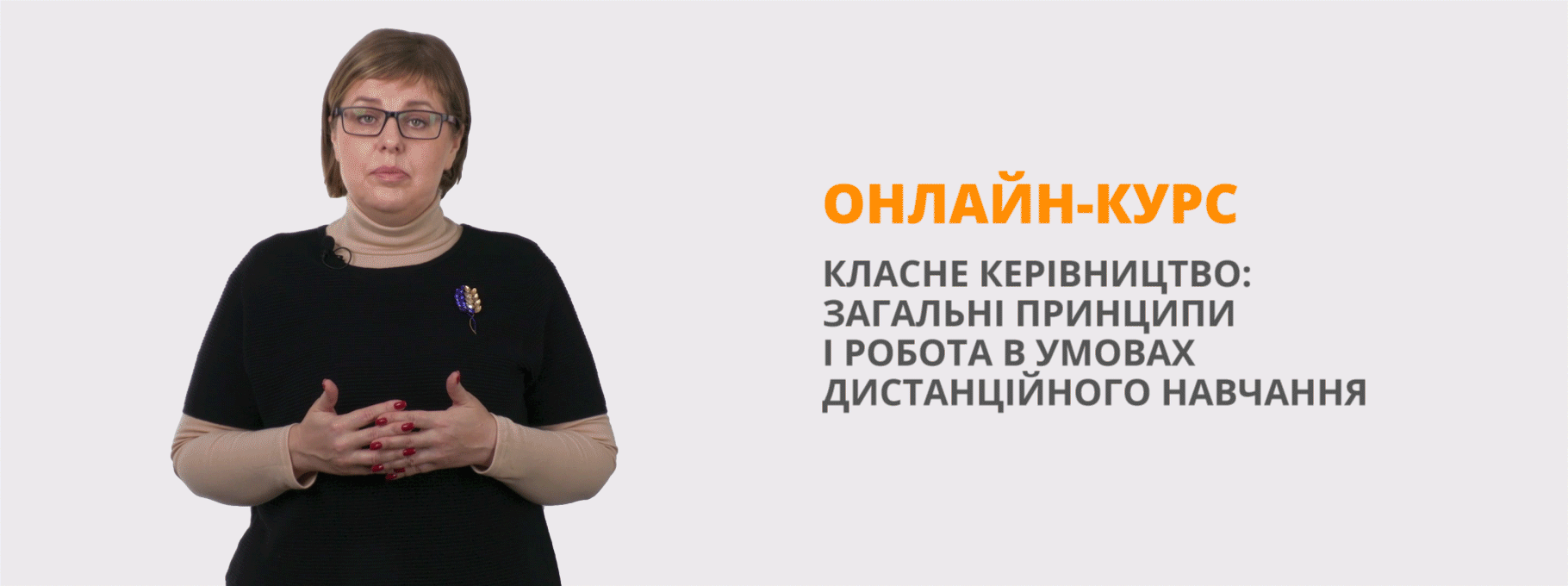«Нова українська школа: реалізація інтегрованих змістовних ліній засобами сприймання на слух (аудіювання) в 5-х класах з поглибленим вивченням англійської мови»
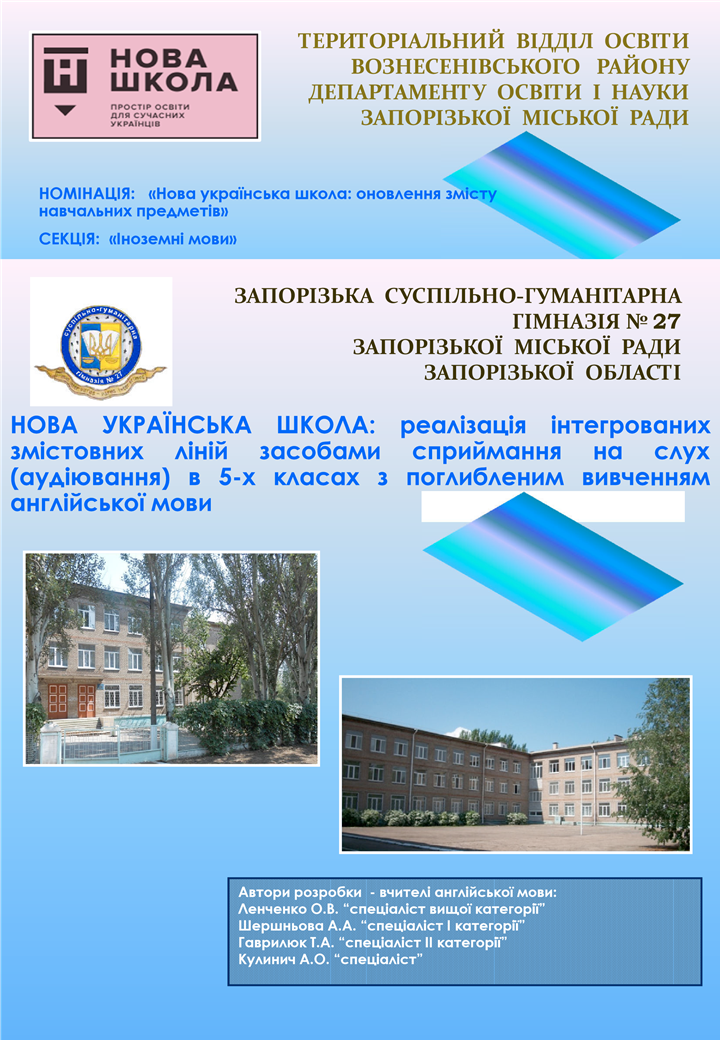

|
Вступ
|
2 |
|
|
|
|
Теоретичний блок
|
4 |
|
|
|
|
Блок-схеми
|
9 |
|
|
|
|
Практичний блок
|
13 |
|
|
|
|
Список літератури
|
71 |
1
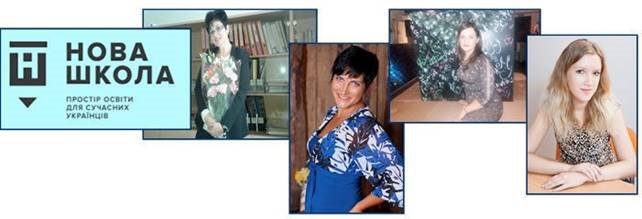
Шановні колеги!
Запропонований Вашій увазі досвід з питань впровадження в навчальний процес вимог Концепції Нової української школи в частинні формування компетентності спілкування іноземними мовами є результатом роботи вчителів англійської мови гімназії №27. Дані матеріали презентують практичні напрацювання щодо реалізації інтегрованих змістовних ліній (відповідно до навчальної програми) при вивченні англійської мови засобами сприймання на слух (аудіювання) в 5-х класах з поглибленим вивченням англійської мови.
У гімназії визнана пріоритетною компетентнісно спрямована освітня парадигма, що базується на принципі дитиноцентризма та є пріоритетною в аспекті реалізації Концепції Нової української школи. Отже, проектування освітніх процесів іде «від дитини», від її потреб, мотивів, можливостей та здібностей. Тому пріоритетним у гімназії обраний такий вид педагогічної діяльності, що базується, насамперед, на всебічній діагностиці рівнів формування компетентності дитини, її навчальних можливостей; компонентів фізичного, психічного та інтелектуального здоров'я; особливостей основних психологічних характеристик (мислення, домінуючого виду пам'яті і сприйняття навчального матеріалу); рівнів вольового, емоційного та мотиваційного розвитку дитини.
Слід зазначити, що шкільне методичне об’єднання вчителів англійської мови працює над реалізацією проблемної теми «Розвиток компетентності спілкування іноземною мовою через формування наскрізних вмінь учнів у відповідності до Концепції Нової української школи». Згідно «Канви» розвитку учнів, запропонованою МОН України, вчитель має формувати наступні наскрізні вміння в процесі вивчення іноземної мови:
![]() вміння доносити думку; вміння логічного захисту позиції; вміння вирішення проблеми, подолання ризиків та прийняття рішення; вміння роботи в команді.
вміння доносити думку; вміння логічного захисту позиції; вміння вирішення проблеми, подолання ризиків та прийняття рішення; вміння роботи в команді.
У відповідності до вищезазначених вмінь обираються і технології навчання. А саме: технологія комунікативного навчання іноземних мов, проектні технології, технології розвитку критичного мислення, технології навчання як дослідження, інтерактивні технології, технології колективного та групового
2
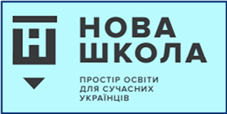 способу навчання, технології особистісноорієнтованого навчання. А також нова для нашого колективу – EQ-технологія (технологія розвитку емоційного інтелекту).
способу навчання, технології особистісноорієнтованого навчання. А також нова для нашого колективу – EQ-технологія (технологія розвитку емоційного інтелекту).
У практичній частині запропоновано до розгляду авторські дидактичні розробки текстів для
аудіювання в 5-х класах (з поглибленим вивченням англійської мови) з відповідними завданнями для виконання контрольної функції вчителем з використанням on-line програми Exam time. Тексти укладено вчителями у відповідності до тематики ситуативного спілкування навчальної програми. Кожен текст має два блоки: «Тeacher’s page» та «Student’s page». Перший блок «ABOUT MYSELF» має зразки скріншотів (Screenshots of the tasks), які наочно демонструють вигляд карток-контролю розуміння почутого:
![]() картки відповідності лексичних одиниць; картки надання відповідей на запитання; блок карток на заповнення пропущених слів; Картки TRUE/FALSE.
картки відповідності лексичних одиниць; картки надання відповідей на запитання; блок карток на заповнення пропущених слів; Картки TRUE/FALSE.
В інших блоках наведено лише посилання на програму Exam time, за допомогою яких можна здійснити відповідний контроль розуміння учнями прослуханих текстів.
Для більшого розуміння питання реалізації компетентнісного підходу відповідно до Концепції Нової української школи ми розробили комплекс наочних схем, наведених далі за блоком теоретичного обґрунтування обраної теми.
А саме:
![]() СХЕМА№1: Впровадження компетентнісного підходу в галузі «Іноземні мови».
СХЕМА№1: Впровадження компетентнісного підходу в галузі «Іноземні мови».
![]() СХЕМА№2: Канва реалізації інтегрованих змістовних ліній через тематику ситуативного спілкування в 5-х класах з поглибленим вивченням англійської мови.
СХЕМА№2: Канва реалізації інтегрованих змістовних ліній через тематику ситуативного спілкування в 5-х класах з поглибленим вивченням англійської мови.
![]() СХЕМА№3: Орієнтовна схема використання освітніх технологій для формування наскрізних вмінь учнів.
СХЕМА№3: Орієнтовна схема використання освітніх технологій для формування наскрізних вмінь учнів.
![]() СХЕМА№4: Нова українська школа. «Канва» розвитку учня.
СХЕМА№4: Нова українська школа. «Канва» розвитку учня.
Дані та інші практичні матеріали наших вчителів розміщено на блозі: englishgroup 293. wordpress.com. Тож сподіваємося, що наші напрацювання стануть у нагоді нашим колегам та допоможуть реалізації інтегрованих змістовних ліній у відповідності до «Канви» розвитку учнів в межах реалізації Концепції Нової української школи.
З повагою, Оксана Ленченко, Анжеліка Шершньова,
Тетяна Гаврилюк, Аліна Кулинич, вчителі англійської мови
Запорізької суспільно-гуманітарної гімназії №27
3
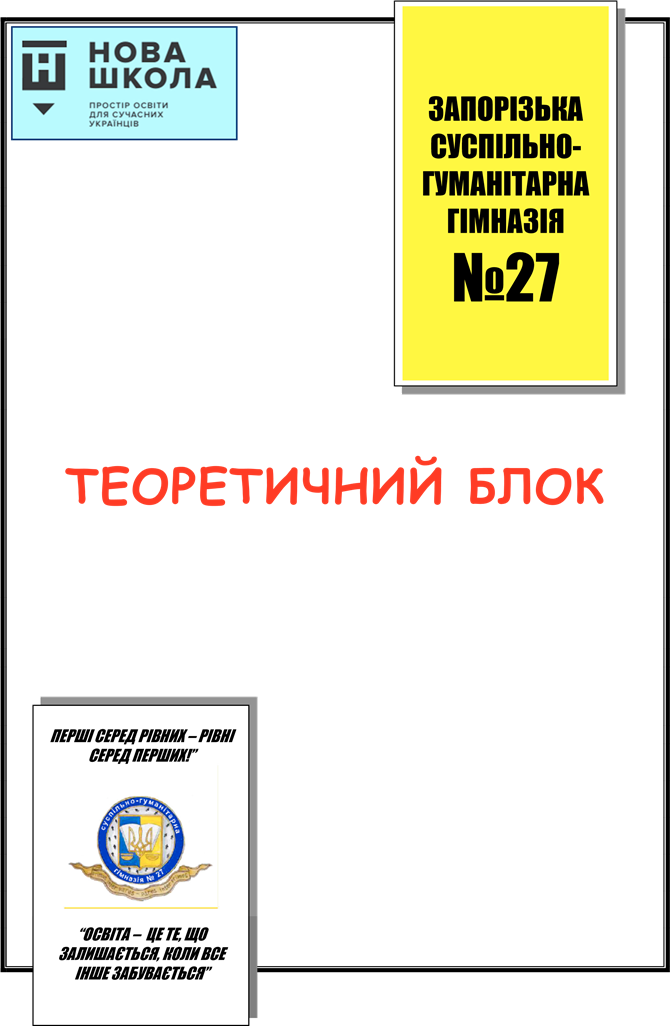
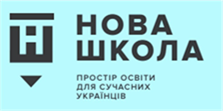 ВПРОВАДЖЕННЯ КОМПЕТЕНТНІСНОГО
ВПРОВАДЖЕННЯ КОМПЕТЕНТНІСНОГО
ПІДХОДУ В ГАЛУЗІ «ІНОЗЕМНІ МОВИ»
Сучасна парадигма шкільної освіти розглядає іноземну мову як важливий засіб міжкультурного спілкування. Такий підхід
зорієнтовує процес навчання на формування у випускників загальноосвітніх навчальних закладів здатності до соціального контакту з представниками іншої лінгвокультури в найтиповіших ситуаціях мовленнєвої взаємодії.
Процес реформування освітньої галузі та виконання вимог Концепції Нової української школи (НУШ) має на увазі, перш за все, реалізацію 8 ключових компонентів. А саме:
1. Новий зміст освіти, заснований на формуванні компетентностей, необхідних для успішної самореалізації в суспільстві.
2. Умотивований учитель, який має свободу творчості й розвивається професійно.
3. Наскрізний процес виховання, який формує цінності.
4. Децентралізація та ефективне управління, що надасть школі реальну автономію.
5. Педагогіка, що ґрунтується на партнерстві між учнем, учителем і батьками.
6. Орієнтація на потреби учня в освітньому процесі, дитиноцентризм.
7. Нова структура школи, яка дозволяє добре засвоїти новий зміст і набути компетентності для життя.
8. Справедливий розподіл публічних коштів, який забезпечує рівний доступ усіх дітей до якісної освіти.
Реалізація вищезазначених компонентів спрямована на формування 10 ключових компетентностей для Нової української школи:
1. Спілкування державною (і рідною у разі відмінності) мовами.
2. Спілкування іноземними мовами.
3. Математична грамотність.
4. Компетентності в природничих науках і технологіях.
5. Інформаційно-цифрова компетентність.
6. Уміння вчитися впродовж життя.
7. Соціальні і громадянські компетентності.
8. Підприємливість.
9. Загальнокультурна грамотність.
10. Екологічна грамотність і здорове життя.
Компетентності (згідно з Концепцією НУШ) - це динамічна комбінація знань, умінь, цінностей та ставлень на їхній основі, які визначають здатність ОСОБИ успішно вирішувати життєві проблеми, провадити професійну і подальшу навчальну діяльність.
У межах репрезентації даного досвіду особливу увагу ми приділяємо формуванню компетентності спілкування іноземними мовами.
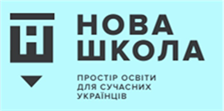 Слід зазначити, що вищезазначений вид професійної діяльності вчителя іноземної мови не є новим і компетентнісний підхід щодо викладання навчальних дисциплін успішно втілюється ще з
Слід зазначити, що вищезазначений вид професійної діяльності вчителя іноземної мови не є новим і компетентнісний підхід щодо викладання навчальних дисциплін успішно втілюється ще з
2006 року. Були різні підходи та автори щодо
впровадження К-підходу: Европейська модель, моделі І. Родигіної, І. Єрмакова, тощо. Ми всі з вами формували предметні компетентності в межах вивчення іноземної мови. Мовну компетенцію – через фонетику, орфографію, лексику, граматику. Мовленнєву компетенцію – через навчання аудіюванню, читанню, говорінню, письму.Соціокультурну компетенцію – засобами країнознавчого та лінгвокраїнознавчого компоненту.
У межах реалізації Концепції Нової української школи передбачено формування таких ключових компетентностей, як:
![]() Уміння вчитися.
Уміння вчитися.
Ініціативність і підприємливість.
Екологічна грамотність і здорове життя.
Соціальна та громадянська компетентності.
Дані компетентності є метапредметними і можуть формуватися відразу засобами усіх навчальних предметів. В тому числі і під час вивчення іноземної мови. Відповідно до цих метапредметних компетентностей у навчальній програмі виокремлено такі інтегровані змістовні лінії, як:
![]() Екологічна безпека та сталий розвиток.
Екологічна безпека та сталий розвиток.
Громадянська відповідальність.
Здоров’я і безпека.
Підприємливість та фінансова грамотність.
Реалізація даних змістовних ліній спрямована на формування в учнів здатності застосовувати знання й уміння у різних життєвих ситуаціях. Діяльність та уміння із змістовних ліній добираються відповідно до тематики ситуативного спілкування (зазначеної у навчальній програмі), комунікативної потреби, вікових особливостей розвитку учнів, рівню їх підготовленості (СХЕМА№1).
Оскільки представлений колективний досвід пропонує конкретну розробку комунікативного блоку завдань сприймання на слух (аудіювання) в 5х класах з поглибленим вивченням англійської мови, інтегровані змістовні лінії реалізуються через наступну тематику ситуативного спілкування (СХЕМА№2):
![]() Я, моя родина, мої друзі.
Я, моя родина, мої друзі.
Одяг.
Харчування.
Відпочинок і дозвілля.
Природа.
Подорож.
Рідне місто/село.
Свята і традиції.
Шкільне життя.
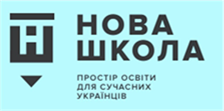 Теоретичне пояснення наших підходів щодо процесу формування ключових компетентностей та наскрізних вмінь учнів не було б повним, якщо б ми не зупинилися на «Канві» розвитку учня (СХЕМА№4). В поданій схемі нас
Теоретичне пояснення наших підходів щодо процесу формування ключових компетентностей та наскрізних вмінь учнів не було б повним, якщо б ми не зупинилися на «Канві» розвитку учня (СХЕМА№4). В поданій схемі нас
цікавить, звичайно, формування такої ключової компетентності, як «Спілкування іноземними мовами». Формування даної компетентності передбачає, насамперед, наступні наскрізні вміння:
![]() вміння доносити думку; вміння логічного захисту позиції;
вміння доносити думку; вміння логічного захисту позиції;
вміння вирішення проблеми, подолання ризиків та прийняття
рішення; ![]() вміння роботи в команді.
вміння роботи в команді.
Як ми бачимо, переважає і надалі комунікативний підхід у навчанні іноземним мовам. Він орієнтований на організацію процесу навчання, адекватного процесу реального спілкування завдяки моделюванню основних закономірностей мовленнєвого спілкування. У процесі навчання за комунікативним методом учні набуваютькомунікативної компетенції — здатності користуватись мовою залежно від конкретної ситуації. Дану компетентність вчителі іноземних мов формували протягом багатьох останніх років. Але час диктує нові вимоги. І ми мусимо виходити за межі предметних компетентностей у поле метапредметних. Формувати запропоновані наскрізні вміння, звичайно, можна вже добре відомими всім освітніми технологіями навчання. Ми розробили орієнтовну схему використання освітніх технологій для формування наскрізних вмінь учнів (СХЕМА№3). Вона є зразком і вибір використання освітніх технологій залежить від учителя та поставлених комунікативних завдань. Зазначимо лише, що поряд з відомими інноваційними технологіями, доцільно звернути увагу на технологію розвитку емоційного інтелекту (EQ-технологія), яка передбачає здатність розуміти та керувати своїми емоціями та емоціями інших.
Вищенаведений стислий теоретичний опис особливостей впровадження сучасних ідей Концепції Нової української школи дає змогу вчителю ознайомитися з вже опрацьованими нормативними та методичними вимогами впровадження компетентнісного підходу до навчання та продовжувати надалі успішно розробляти свої індивідуальні підходи з реалізації цього питання.
У межах практичної частини досвіду ви маєте змогу ознайомитися з прикладним підходом щодо використання всіх вищезазначених аспектів впровадження Концепції Нової української школи в частині розробки конкретного мовного інвентарю, спрямованого на формування в учнів 5-х класів навичок сприймання на слух (аудіювання) протягом всього навчального року відповідно до тематики ситуативного спілкування.
І наприкінці глави зазначимо, що педагогічний колектив Запорізької суспільно-гуманітарної гімназії №27 впроваджує компетентнісний підхід до навчання вже багато років. Цей напрямок діяльності сформовано із багаторічного успішного досвіду нашої командної роботи. Принцип дитиноцентризму не є для нас новим, бо ми вже давно здійснили перехід:
![]() від інформаційно-когнітивної
від інформаційно-когнітивної
від уроку як авторитарного монологу до уроку взаємодії та
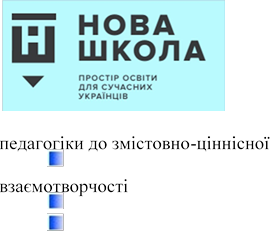 від школоцентризму до дитиноцентризму від вербальної школи до школи дій
від школоцентризму до дитиноцентризму від вербальної школи до школи дій
Завдяки цьому ми маємо суттєві досягнення у різних сферах діяльності та навчання учнів. Але ми не зупиняємося на місті та крокуємо далі, не забуваючи старі та апробовані підходи, освоюємо нові, сучасні.
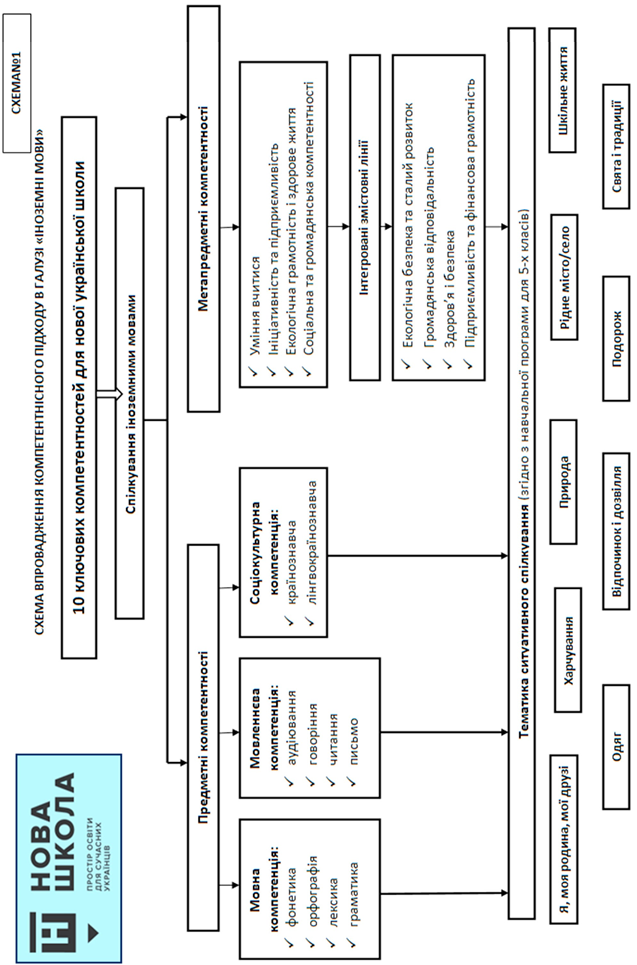
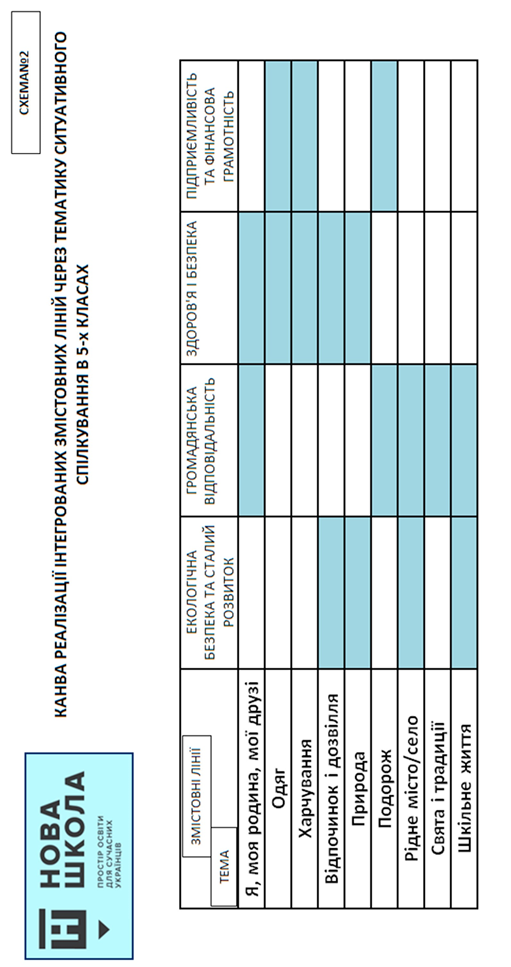
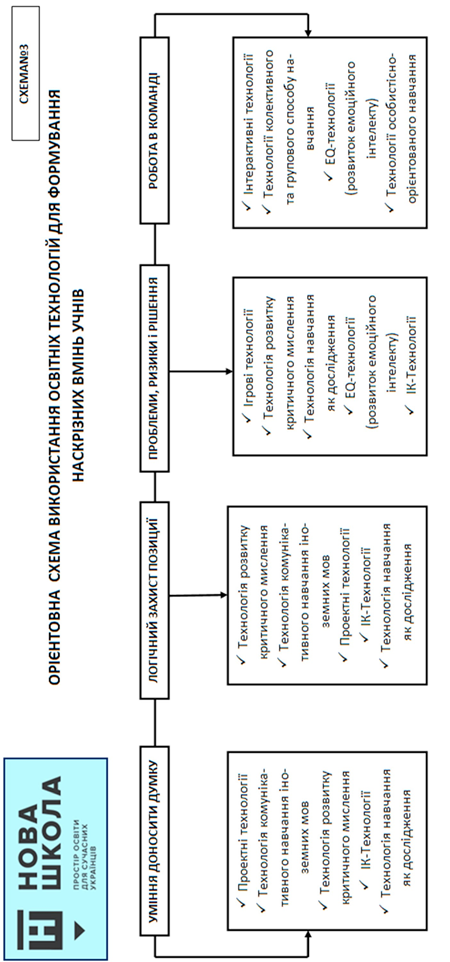
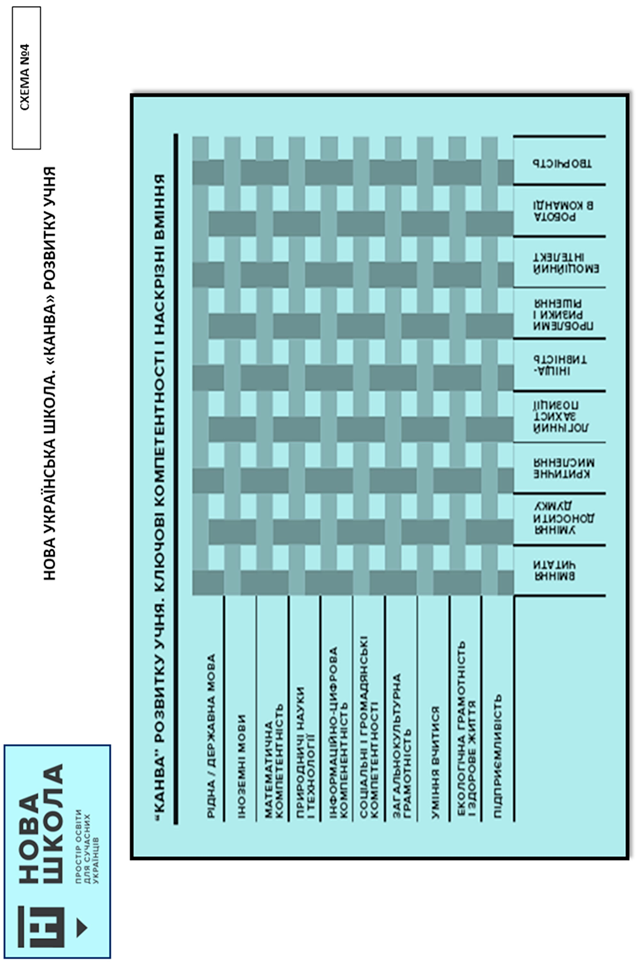
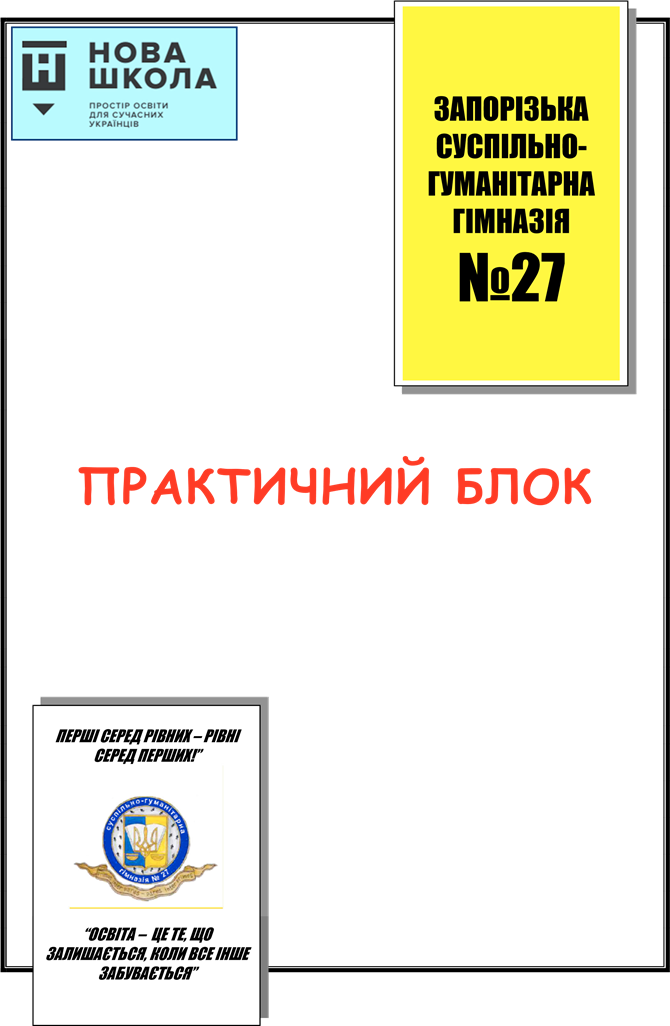
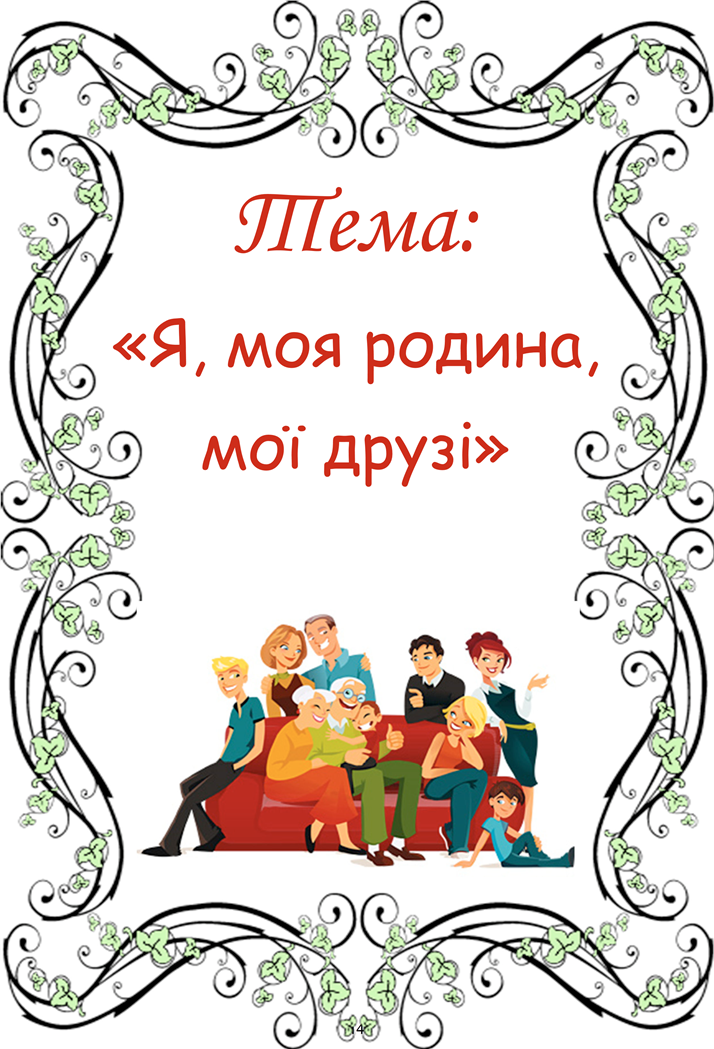
Listening 1 - teacher’s page -
ABOUT MYSELF
1. Listen to the text:
Hello! My name is Mia. I'm from Argentina. I'm 12 and I'm a pupil. I'm tall and slim. My hair is long, curly and fair. I've got blue eyes and thin lips. My nose is small.
I have got a family. It isn't big. I have a mother, a father and a little sister. I'm very happy that I'm not the only child in the family. My mum is a nurse and my dad is a fire fighter. My sister wants to become an artist. And my dream is to become a vet, because I want to help sick animals.
My family is hard-working. We always help each other. Everyone has his own duty. Dad goes shopping. Mum cooks. My sister and I help our parents with chores: we water the flowers, wash dishes and tidy up our rooms.
I've got a hobby. It's horse riding. I love horses very much. They are kind majestic animals. I go horse riding 3 times a week. I'm really good at it. Horse riding is not just a great hobby. It’s also an excellent way to keep us healthy, because we spend much time outdoors. My younger sister Patricia usually goes with me. But she can't ride horses. Patty is afraid of height. She just comes to look at horses. Patricia loves them as much as I do.
Also, my sister and I like gymnastics. Our favourite athlete is Lilia Podkopayeva. She is Ukrainian. Her birthday is in August. Lilia is one of the best gymnasts in the world. Though her career was short, Lilia was the first woman to hold the European, World and Olympic all-around title at the same time.
She is a not just a great athlete, but she's also a beautiful woman. She has brown straight hair. Her eyes are brown too. She isn't tall. She is short. Her height is 155 cm. Lilia is well-built.
She's not plump. She's great.
I hope that in future I will be as beautiful and successful as my favourite athlete is.
2. Listen and repeat words and word combinations:
1. curly and fair
2. hard-working
3. tidy up
4. own duty
5. chores
6. spend time outdoors
7. be afraid of height
8. all-around title
9. well-built
10. successful
3. Choose the correct Ukrainian equivalent:
|
1. curly and fair 2. hard-working 3. tidy up |
a) домашня робота b) боятися висоти c) свої обов’язки |
4. own duty
5. chores
6. spend time outdoors
7. be afraid of height
8. all-around title
9. well-built
10. successful
4. Listen to the text one more time.
d) прибирати
e) кучерявий та світлий
f) працьовитий
g) гарної статури
h) проводити час на відкритому повітрі
i) успішний
j) титул багатоборств
5. Choose the correct answer to the question:
1. Where is Mia from?
a) Australia
b) Ukraine
c) Argentina
2. What is Mia’s dream?
a) to become a vet
b) to become a nurse
c) to become an artist
3. What is she good at?
a) cooking
b) horse riding
c) doing gymnastics
4. What is Mia’s favourite sport?
a) horse riding
b) gymnastics
c) doing shopping
5. Why can’t Mia’s sister ride horses?
a) because she is afraid of high
b) because she looks at horses
c) because she likes gymnastics
6. Who is Lilia Podkopayeva?
a) Mia’s sister
b) a famous gymnast
c) a famous horse rider
6. Fill in the missing words or words combinations:
1. My hair is long, _____ and _____.
2. I'm very happy that I'm not _____ in the family.
3. My mum is a_____ and my dad is a_____.
4. My sister and I help our parents with_____: we water the flowers, wash dishes and _____ our rooms.
5. It’s also an excellent way to keep us healthy, because we spend much time_____.
6. I hope that in future I will be as beautiful and _____ as my favourite athlete is. 7 Lilia was the first woman to hold the European, World and Olympic _____ title at the same time.
8. My family is _____.
9. Everyone has his own _____.
10. Patty is afraid of _____.
7. Mark true (T) or false (F) sentences:
1. My name is Mia. I'm from Argentina.
2. I'm very happy that I'm the only child in the family.
3. My sister wants to become a vet.
4. Everyone has his own duty. Dad goes shopping. Mum cooks.
5. I've got a hobby. It's doing gymnastics.
6. Horse riding is just a great hobby.
7. My sister and I like gymnastics.
8. Our favourite athlete is Ani Lorak.
9. Lilia was the first woman to hold the European, World and Olympic all-around title at the same time.
10. I hope that in future I will be as hard-working and well-built as my favourite athlete is.
8. Write some sentences about your hobby.
Keys:
Exercise 3. 1) e, 2) f, 3) d, 4)c, 5)a, 6)h, 7)b, 8)j, 9)g, 10)i.
Exercise 5. 1) c, 2) a, 3) b, 4) b, 5) a, 6) b.
Exercise 6. 1) curly, fair 2) the only child 3) nurse, fire fighter 4) chores, tidy up
5) outdoors 6) successful 7) all-around 8) hardworking 9) duty 10) height.
Exercise 7. 1) T 2) F 3) F 4) T 5) F 6) F 7) T 8) F 9) T 10) F.
![]()
Exercise 2 https://www.goconqr.com/en-US/p/11172055
Exercise 5 https://www.goconqr.com/en-US/p/11173600
Exercise 6 https://www.goconqr.com/en-US/p/11205540
Exercise 7 https://www.goconqr.com/en-US/p/11174285
Listening 1 - student’s page -
ABOUT MYSELF
1. Listen to the text.
2. Listen and repeat words and word combinations:
1. curly and fair
2. hard-working
3. tidy up
4. own duty
5. chores
6. spend time outdoors
7. be afraid of height
8. all-around title
9. well-built
10. successful
3. Choose the correct Ukrainian equivalent:
1. curly and fair
2. hard-working
3. tidy up
4. own duty
5. chores
6. spend time outdoors
7. be afraid of height
8. all-around title
9.
 |
well-built
10. successful
4. Listen to the text one more time.
a) домашня робота
b) боятися висоти
c) свої обов’язки
d) прибирати
e) кучерявий та світлий
f) працьовитий
g) гарної статури
h) проводити час на відкритому повітрі
i) успішний
j) титул багатоборств
5. Choose the correct answer to the question:
1. Where is Mia from?
a) Australia
b) Ukraine
c) Argentina
2. What is Mia’s dream?
a) to become a vet
b) to become a nurse
c) to become an artist
3. What is she good at?
a) cooking
b) horse riding
c) doing gymnastics
4. What is Mia’s favourite sport?
a) horse riding
b) gymnastics
c) doing shopping
5. Why can’t Mia’s sister ride horses?
a) because she is afraid of high
b) because she looks at horses
c) because she likes gymnastics
6. Who is Lilia Podkopayeva?
a) Mia’s sister
b) a famous gymnast
c) a famous horse rider
6. Fill in the missing words or words combinations:
1. My hair is long, _____ and _____.
2. I'm very happy that I'm not _____ in the family.
3. My mum is a_____ and my dad is a_____.
4. My sister and I help our parents with_____: we water the flowers, wash dishes and _____ our rooms.
5. It’s also an excellent way to keep us healthy, because we spend much time_____.
6.
 |
I hope that in future I will be as beautiful and _____ as my favourite athlete is. 7 Lilia was the first woman to hold the European, World and Olympic _____ title at the same time.
8. My family is _____.
9. Everyone has his own _____.
10. Patty is afraid of _____.
7. Mark true (T) or false (F) sentences:
1. My name is Mia. I'm from Argentina.
2. I'm very happy that I'm the only child in the family.
3. My sister wants to become a vet.
4. Everyone has his own duty. Dad goes shopping. Mum cooks.
5. I've got a hobby. It's doing gymnastics.
6. Horse riding is just a great hobby.
7. My sister and I like gymnastics.
8. Our favourite athlete is Ani Lorak.
9. Lilia was the first woman to hold the European, World and Olympic all-around title at the same time.
10. I hope that in future I will be as hard-working and well-built as my favourite athlete is.
8. Write some sentences about your hobby.
Listening 1
ABOUT MYSELF
Screenshots of the tasks
2. Listen and repeat words and word combinations:
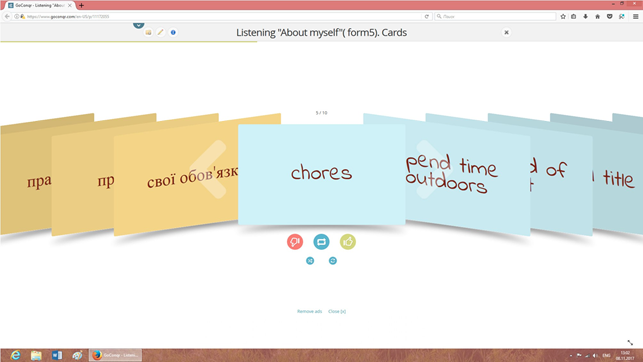
5. Choose the correct answer to the question:
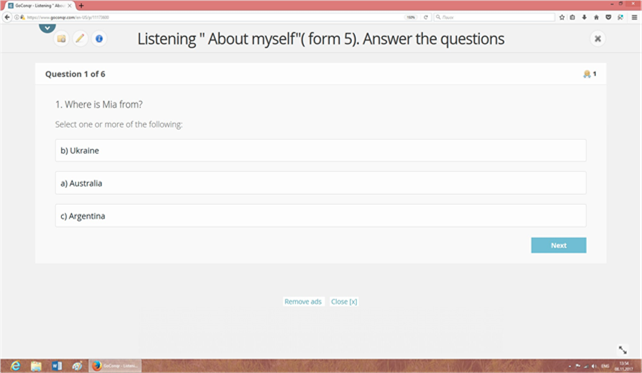
6. Fill in the missing words or words combinations:
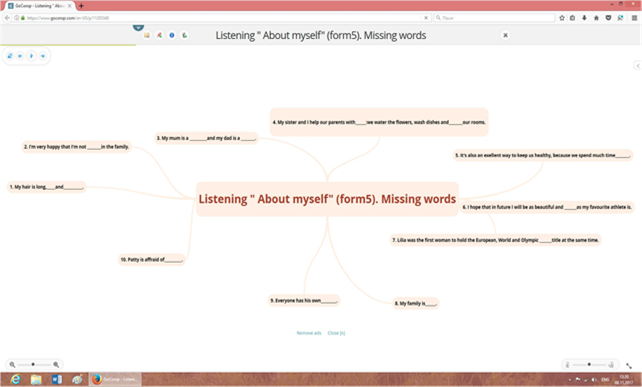
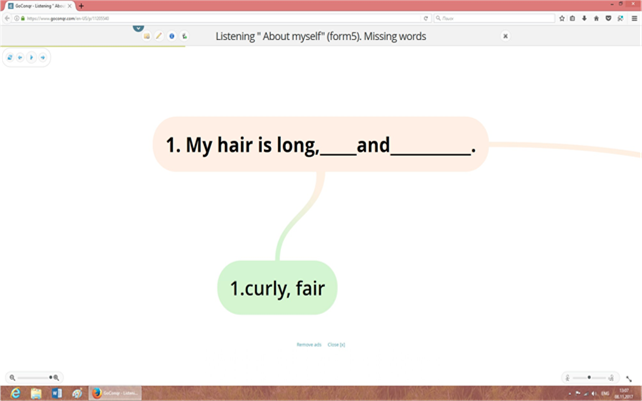
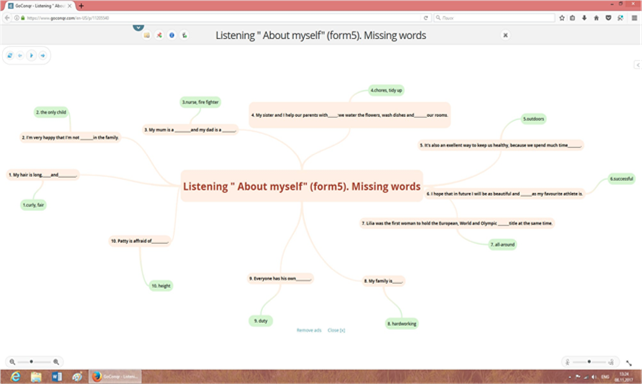
7. Mark true (T) or false (F) sentences:
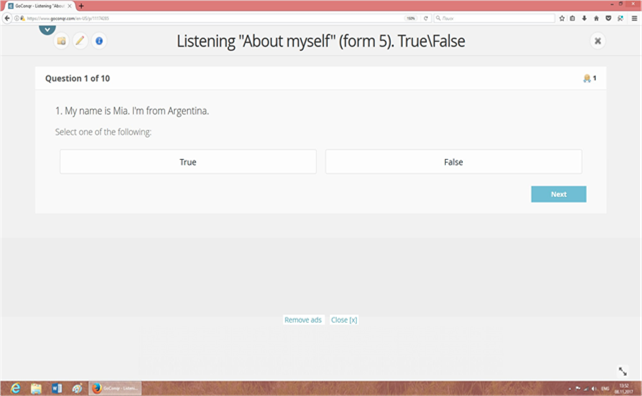
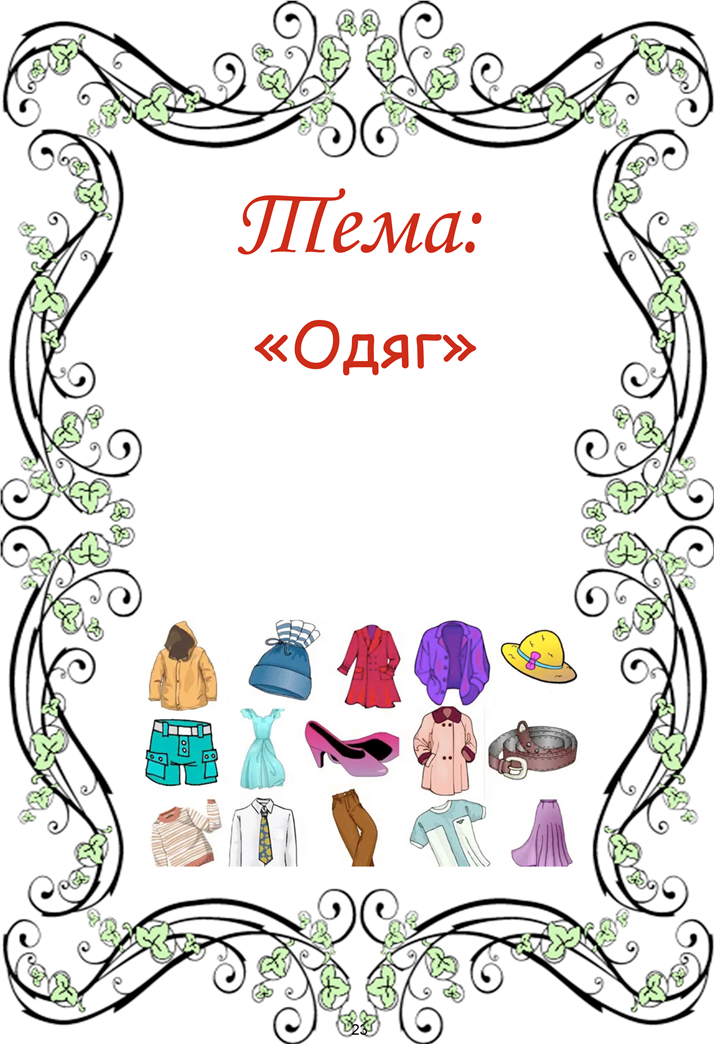
Listening 2 - teacher’s page -
CLOTHES
1. Listen to the text:
Tomorrow is a great day. Tomorrow is Susan’s birthday. A lot of friends are coming and Susy wants to look gorgeous. So, she goes shopping. She is looking for a yellow cotton dress. Yellow is Susan’s favourite colour. She also likes green and pink. She hates blue.
Susan has got so many clothes in her wardrobe, but she thinks it’s not enough for her. She wears different clothes for different events according to different weather. At parties, for example, Susy usually wears dresses and high heels. She doesn’t like flat shoes though they’re more comfortable than high heels. When Susan hangs out with friends she prefers to wear jeans and tops. The girl puts on T-shirt, shorts and trainers when she is doing exercises at the gym. When it’s raining or cold Susy wears a coat, trousers and boots. In winter she likes to wear sweatshirts. When it’s boiling hot she chooses light blouses, skirts and sandals.
Her favourite clothes is a school uniform. It looks very nice. Susan wears a green shirt and a green skirt. She also has a silk tie. Once a month all the pupils of Susan’s school can wear their casual style. But Susy doesn’t do it. Her school uniform suits her.
Susy is in the clothes shop near her house. She sees her friend Tony there. He is looking for a present for Susan. He chooses between leather gloves and a wool scarf. The scarf is more expensive, but it’s really amazing. Tony has enough money. He can buy this expensive scarf. Tony is rich. He’s got a well-paid job.
When Tony sees Susy he comes to say Hello to his friend. He is glad to see her. They are the best friends from the childhood. Tony helps Susan to choose the dress for the party.
Then Susy goes home. She is very excited about tomorrow and she can’t sleep. Tomorrow, when she wakes up, her friends will come to greet her. And Tony will bring a beautiful pink scarf as
a present.
2. Listen and repeat words and word combinations:
1. to look gorgeous
2. to look for
3. according to
4. hang out with
5. prefer
6. boiling hot
7. once a month
8. a well-paid job
9. to be excited about
10. to greet her
3. Choose the correct Ukrainian equivalent:
1. to look gorgeous
2. to look for
3. according to
a) раз на місяць
b) добре оплачувана робота
c) шукати
4. hang out with
5. prefer
6. boiling hot
7. once a month
8. a well-paid job
9. to be excited about
10. to greet her
4. Listen to the text one more time.
5. Choose the correct answer to the question:
d) віддавати перевагу
e) відпочивати з друзями
f) гарно виглядати
g) у відповідності з
h) неймовірне пекло
i) бути в захваті від
j) вітати її
1. What is tomorrow?
a) Sunday
b) Susan’s birthday
a) halloween party
2. What is Susan’s favourite colour?
a) yellow
b) blue
c) pink
3. What does Susy usually wear at parties?
a) flat shoes and jeans
b) dresses and high heels
c) shorts and trainers 4. What is Susy’s favourite clothes?
a) trousers and boots
b) skirts and sandals
c) a green shirt and a green skirt 5. What does Tony help to choose her?
a) a dress
b) a present.
c) a silk tie
6. What will Tony bring as a present?
a) high heels
b) a pink scarf
c) a yellow dress
6. Fill in the missing words or words combinations:
1. A lot of friends are coming and Susy wants to_____.
2. She wears different clothes for different events _____ different weather.
3. When Susan hangs out with friends she prefers to wear _____ and _____.
4. She doesn’t like _____ though they’re more comfortable than high heels.
5. In winter she likes to wear_____.
6. Her favourite clothes is a _____.
7. Once a month all the pupils of Susan’s school can wear their_____.
8. He chooses between leather gloves and_____.
9. She is very_____ about tomorrow and she can’t sleep.
10. Tony helps Susan to choose _____ for the party.
7. Mark true (T) or false (F) sentences:
1. Yellow is Susan’s favourite colour.
2. She hates green and pink.
3. At parties, for example, Susy usually wears dresses and flat shoes.
4. She likes flat shoes because they’re more comfortable than high heels.
5. The girl puts on T-shirt, shorts and trainers when she is doing exercises at the gym.
6. When it’s raining or cold Susy wears a coat, jeans and sandals.
7. When it’s boiling hot she chooses light blouses, skirts and sandals.
8. She also has a silk tie.
9. He can’t buy this expensive scarf. Tony is poor. He’s got low - paid job.
10. Tony will bring a beautiful pink scarf as a present.
8. Write some sentences about your look (what do you prefer wearing and when?).
Keys:
Exercise 3. 1) f, 2) c, 3) g, 4) e, 5) d, 6) h, 7) a, 8) b, 9) i, 10) j.
Exercise 5. 1) b, 2) a, 3) b, 4) c, 5) a, 6) b.
Exercise 6. 1) look gorgeous, 2) according to. 3) jeans and tops, 4) flat shoes, 5) sweatshirts, 6) a school uniform, 7) casual style, 8) a wool scarf, 9) excited, 10) the dress.
Exercise 7. 1) T, 2) F, 3) F, 4) F, 5) T, 6) F, 7) T, 8) T, 9) F, 10) T.
![]()
Exercise 2 https://www.goconqr.com/en-US/p/11206306
Exercise 5 https://www.goconqr.com/en-US/p/11229551
Exercise 6 https://www.goconqr.com/en-US/p/11229723
Exercise 7 https://www.goconqr.com/en-US/p/11231083
Listening 2 -student’s page -
CLOTHES
1. Listen to the text.
2. Listen and repeat words and word combinations:
1. to look gorgeous
2. to look for
3. according to
4. hang out with
5. prefer
6. boiling hot
7. once a month
8. a well-paid job
9. to be excited about
10. to greet her
3. Choose the correct Ukrainian equivalent:
1. to look gorgeous
2. to look for
3. according to
4. hang out with
5. prefer
6. boiling hot
7. once a month
8. a well-paid job
9. to be excited about
10.
 |
to greet her
4. Listen to the text one more time.
5. Choose the correct answer to the question:
1. What is tomorrow?
a) Sunday
b) Susan’s birthday
a) halloween party
2. What is Susan’s favourite colour?
a) yellow
b) blue
c) pink
3. What does Susy usually wear at parties?
a) flat shoes and jeans
b) dresses and high heels
c) shorts and trainers
a) раз на місяць
b) добре оплачувана робота
c) шукати
d) віддавати перевагу
e) відпочивати з друзями
f) гарно виглядати
g) у відповідності з
h) неймовірне пекло
i) бути в захваті від
j) вітати її
4. What is Susy’s favourite clothes?
a) trousers and boots
b) skirts and sandals
c) a green shirt and a green skirt 5. What does Tony help to choose her?
a) a dress
b) a present.
c) a silk tie
6. What will Tony bring as a present?
a) high heels
b) a pink scarf
c) a yellow dress
6. Fill in the missing words or words combinations:
1. A lot of friends are coming and Susy wants to_____.
2. She wears different clothes for different events _____ different weather.
3. When Susan hangs out with friends she prefers to wear _____ and _____.
4. She doesn’t like _____ though they’re more comfortable than high heels.
5. In winter she likes to wear_____.
6. Her favourite clothes is a _____.
7. Once a month all the pupils of Susan’s school can wear their_____.
8.
 |
He chooses between leather gloves and_____.
9. She is very_____ about tomorrow and she can’t sleep.
10. Tony helps Susan to choose _____ for the party.
7. Mark true (T) or false (F) sentences:
1. Yellow is Susan’s favourite colour.
2. She hates green and pink.
3. At parties, for example, Susy usually wears dresses and flat shoes.
4. She likes flat shoes because they’re more comfortable than high heels.
5. The girl puts on T-shirt, shorts and trainers when she is doing exercises at the gym.
6. When it’s raining or cold Susy wears a coat, jeans and sandals.
7. When it’s boiling hot she chooses light blouses, skirts and sandals.
8. She also has a silk tie.
9. He can’t buy this expensive scarf. Tony is poor. He’s got low - paid job.
10. Tony will bring a beautiful pink scarf as a present.
8. Write some sentences about your look (what do you prefer wearing and when?).
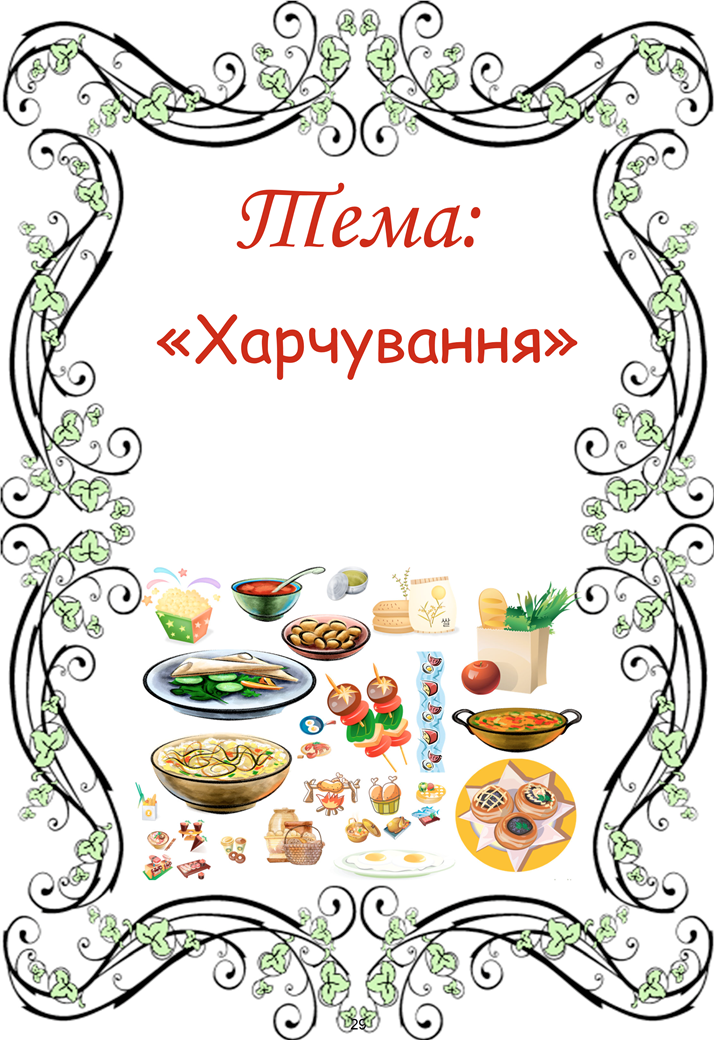
Listening 3 -teacher’s page -
FOOD
1. Listen to the text:
Eating habits are different in each country. People who live near the sea or the ocean eat a lot of seafood, some people prefer fast food like hamburgers, snacks and chips and some people eat only healthy food like vegetables, fruit and dairy products. Italians like pasta. The Belarusians eat potato. Japanese people eat rice. The Argentinians drink a lot of coffee.
As for the British people, they also have their own special eating habits. Almost everybody know their famous 5 o’clock tea, roast beef, bacon and eggs, fish and chips. But what do the British really eat?
The traditional breakfast includes fried bacon, egg, sausage, tomato and fried bread. But people don’t eat it very often now. This kind of breakfast isn’t healthy. Nowadays people prefer to eat milk and cereal or toast with jam or marmalade, fruit juice, tea or coffee for breakfast.
The next meal is called lunch. It is at about 12 or 1 o’clock. At lunchtime people usually have only an hour for a break. So they often just have a sandwich or a snack. In some shops you can find many different kinds of sandwiches. You can buy cheese, ham, tuna or salmon sandwich.
Most people have their main meal – dinner – in the evening. They can prepare their own food or buy some convenience food. They usually do shopping at the supermarket. There they can buy everything they need: from healthy porridge, tomato juice and lettuce to unhealthy candies, chocolate and ice-cream.
Dinner is usually at about 6 or 7 o’clock. People have meat or fish and vegetables. Pizza and pasta are popular, too.
But Brits don’t always eat at home. They often go out. Their traditional food to go is fish and chips. It isn’t expensive, but it’s really delicious. They use cod for it. They can add salt and vinegar if you want to.
There are also many different restaurants that serve food from all over the world.
2. Listen and repeat words and word combinations:
1. eating habits
2. dairy products
3. healthy
4. Nowadays
5. ham, tuna or salmon sandwich
6. main meal
7. convenience food
8. it’s really delicious
9. healthy porridge
10. from all over the world
3. Choose the correct Ukrainian equivalent:
1. eating habits a) сьогодні
2. dairy products b) здоровий (-а)
3. healthy
4. nowadays
5. ham, tuna or salmon sandwich
6. main meal
7. convenience food
8. it’s really delicious 9. healthy porridge
10. from all over the world.
4. Listen to the text one more time.
c) їжа швидкого приготування
d) основний прийом їжі
e) звички в їжі
f) корисна каша
g) з усього світу
h) це реально смачно
i) молочні продукти
j) сендвіч з шинкою, тунцем або лососем
5. Choose the correct answer to the question:
1. What do Italians like?
a) roast beef
b) sausage
c) pasta
2. What do Japanese people eat?
a) rice
b) pasta
c) potato
3. What is a traditional British food?
a) 5 o’clock tea, roast beef, bacon and eggs, fish and chips
b) fried bacon, egg, sausage, tomato and fried bread
c) milk and cereal or toast with jam or marmalade, fruit juice, tea or coffee
4. What does the traditional breakfast include?
a) 5 o’clock tea, roast beef, bacon and eggs, fish and chips
b) fried bacon, egg, sausage, tomato and fried bread
c) milk and cereal or toast with jam or marmalade, fruit juice, tea or coffee
5. What do the British people prefer to eat for breakfast nowadays?
a) 5 o’clock tea, roast beef, bacon and eggs, fish and chips
b) fried bacon, egg, sausage, tomato and fried bread
c) milk and cereal or toast with jam or marmalade, fruit juice, tea or coffee
6. What do Brits often eat when they go out?
a) fish and chips
b) a sandwich or a snack
c) pizza and pasta
6. Fill in the missing words or words combinations:
1. As for the British people, they also have their own special _____.
2. This kind of breakfast isn’t _____.
3. At lunchtime people often have _____ or _____
4. You can buy cheese, ham, tuna or salmon _____.
5. They can prepare their own food or buy some _____ _____.
6. There they can buy everything they need: from _____ _____, tomato juice and lettuce to unhealthy candies, chocolate and ice-cream.
7. Their traditional food to go is _____ and _____.
8. It isn’t expensive, but it’s really _____.
9. Most people have their_____ _____ – dinner – in the evening.
10. There are also many different restaurants that serve food from ____ ____ ____ ____.
7. Mark true (T) or false (F) sentences:
1. Argentinians drink a lot of tea.
2. The traditional British breakfast includes fried bacon, egg, sausage, tomato and fried bread. But people eat it very often now. This kind of breakfast is healthy.
3. Nowadays people prefer to eat milk and cereal or toast with jam or marmalade, fruit juice, tea or coffee for breakfast.
4. At lunchtime people usually have only an hour for a break.
5. In some shops you can find many different kinds of sandwiches. You can buy cereal, ham, sausage or marmalade sandwich.
6. Most people have their main meal – dinner – in the morning.
7. They usually do shopping at the market.
8. There they can buy everything they need: from unhealthy porridge, tomato juice and lettuce to healthy candies, chocolate and ice-cream.
9. Brits don’t always eat at home. They often go out.
10. Their traditional food to go is fish and chips.
8. Write some sentences about your eating habits.
Keys:
Exercise 3. 1) e, 2) i, 3) b, 4) a, 5) j, 6) d, 7) c, 8) h, 9) f, 10) g.
Exercise 5. 1) c, 2) a, 3) a, 4) b, 5) c, 6) a.
Exercise 6. 1) eating habits, 2) healthy, 3) a sandwich or a snack, 4) sandwich, 5) convenience food, 6) healthy porridge, 7) fish and chips, 8) delicious, 9) main meal, 10) all over the world.
Exercise 7. 1) F, 2) F, 3) T, 4) T, 5) F, 6) F, 7) F, 8) F, 9) T, 10) T.
![]()
Exercise 2 https://www.goconqr.com/en-US/p/11346295
Exercise 5 https://www.goconqr.com/en-US/p/11346530
Exercise 6 https://www.goconqr.com/en-US/p/11346706
Exercise 7 https://www.goconqr.com/en-US/p/11346437
Listening 3 - student’s page -
FOOD
1. Listen to the text.
2. Listen and repeat words and word combinations:
1. eating habits
2. dairy products
3. healthy
4. Nowadays
5. ham, tuna or salmon sandwich
6. main meal
7. convenience food
8. it’s really delicious
9. healthy porridge
10. from all over the world
3. Choose the correct Ukrainian equivalent:
1. eating habits a) сьогодні
2. dairy products b) здоровий (-а)
3. healthy c) їжа швидкого приготування
4. nowadays d) основний прийом їжі
5.
ham, tuna or salmon sandwich e) звички в їжі
6. main meal f) корисна каша
7. convenience food g) з усього світу
8. it’s really delicious h) це реально смачно
9. healthy porridge i) молочні продукти
10. from all over the world j) сендвіч з шинкою, тунцем або лососем
4. Listen to the text one more time.
5. Choose the correct answer to the question:
1. What do Italians like?
a) roast beef
b) sausage
c) pasta
2. What do Japanese people eat?
a) rice
b) pasta
c) potato
3. What is a traditional British food?
a) 5 o’clock tea, roast beef, bacon and eggs, fish and chips
b) fried bacon, egg, sausage, tomato and fried bread
c) milk and cereal or toast with jam or marmalade, fruit juice, tea or coffee
4. What does the traditional breakfast include?
a) 5 o’clock tea, roast beef, bacon and eggs, fish and chips
b) fried bacon, egg, sausage, tomato and fried bread
c) milk and cereal or toast with jam or marmalade, fruit juice, tea or coffee
5. What do the British people prefer to eat for breakfast nowadays?
a) 5 o’clock tea, roast beef, bacon and eggs, fish and chips
b) fried bacon, egg, sausage, tomato and fried bread
c) milk and cereal or toast with jam or marmalade, fruit juice, tea or coffee
6. What do Brits often eat when they go out?
a) fish and chips
b) a sandwich or a snack
c) pizza and pasta
6. Fill in the missing words or words combinations:
1. As for the British people, they also have their own special _____.
2. This kind of breakfast isn’t _____.
3. At lunchtime people often have _____ or _____
4. You can buy cheese, ham, tuna or salmon _____.
5. They can prepare their own food or buy some _____ _____.
6. There they can buy everything they need: from _____ _____, tomato juice and lettuce to unhealthy candies, chocolate and ice-cream.
7.
Their traditional food to go is _____ and _____.
8. It isn’t expensive, but it’s really _____.
9. Most people have their_____ _____ – dinner – in the evening.
10. There are also many different restaurants that serve food from ____ ____ ____ ____.
7. Mark true (T) or false (F) sentences:
1. Argentinians drink a lot of tea.
2. The traditional British breakfast includes fried bacon, egg, sausage, tomato and fried bread. But people eat it very often now. This kind of breakfast is healthy.
3. Nowadays people prefer to eat milk and cereal or toast with jam or marmalade, fruit juice, tea or coffee for breakfast.
4. At lunchtime people usually have only an hour for a break.
5. In some shops you can find many different kinds of sandwiches. You can buy cereal, ham, sausage or marmalade sandwich.
6. Most people have their main meal – dinner – in the morning.
7. They usually do shopping at the market.
8. There they can buy everything they need: from unhealthy porridge, tomato juice and lettuce to healthy candies, chocolate and ice-cream.
9. Brits don’t always eat at home. They often go out.
10. Their traditional food to go is fish and chips.
8. Write some sentences about your eating habits.
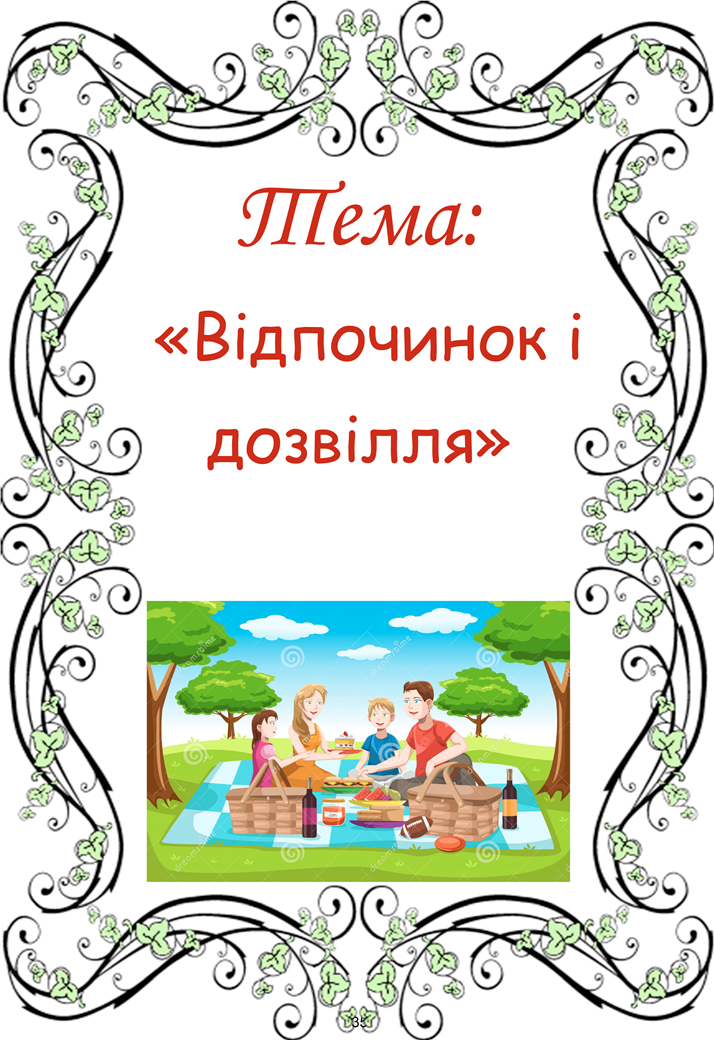
Listening 4 - teacher’s page -
SPARE TIME
1. Listen to the text:
It’s summer. People usually have vacations in summer. There are different ways to spend your free time. The most popular one is travelling. People visit different countries with various purposes: to eat local dishes, to see architecture, to meet new friends.
Before you go to the foreign country you have to make a list of things you need for travelling. Pack documents and clothes to your suitcase. Take some snack with you. And don’t forget your camera. Also, it would be better if you book the hotel before you arrive, so you won’t spend your precious time looking for a place to live.
When you come, leave your luggage in the hotel and go sightseeing on a tour bus. Take as much pictures as you can. Listen to the guide very attentively. The history of each city is unique. It will help you to understand local people and their traditions better. Don’t be afraid to ask questions.
If there is a beach – go straight to it after sightseeing. Swim, sunbathe, relax. But remember that you need to put on your suncream first or you’ll get sunburnt. Try diving, windsurfing, snorkeling. But if you are not a good swimmer you should put on a swim vest. Also be careful with local fauna. Some cute looking animals may harm you.
If you have a picnic at the beach or at the park don’t leave your litter there. Always throw it to the bin. Keep the nature clean everywhere.
When you are abroad, don’t forget to buy souvenirs. It can be a small copy of some building, a badge, a magnet or even a traditional costume. For souvenirs you should go to the flea market. There are many different stalls that sell a lot of things: statues, old coins, furniture, clothes, jewelry, even ancient helmets and swords. By the way, there you can try some local food and communicate with the locals. The only rule: don’t get lost.
When you have some free time, write a postcard to your friends and relatives. Describe your impressions; tell about the weather, what you saw, what you did and what you are going to do.
2. Listen and repeat words and word combinations:
1. to book
2. different ways
3. various purposes
4. precious time 5. luggage
6. go sightseeing
7. harm
8. to throw litter to the bin
9. abroad
10. flea market
3. Choose the correct Ukrainian equivalent:
1. to book
2. different ways
3. various purposes
4. precious time 5. luggage
6. go sightseeing
7. harm
8. to throw litter to the bin
9. to be abroad
10. flea market
4. Listen to the text one more time.
5. Choose the correct answer to the question:
a) багаж
b) дорогоцінний час
c) бути за кордоном
d) різні способи
e) замовляти
f) шкодити
g) різноманітні цілі
h) блошиний ринок
i) кидати сміття в смітник
j) розглядати визначні місця
1. What is the most popular way to spend free time?
a) fishing
b) travelling
c) snorkeling.
2. What would be better to do before you arrive?
a) to book the hotel
b) to pack documents and clothes
c) to take some snack
3. What will you do after you arrive?
a) go sightseeing on a tour bus
b) take as much pictures as you can
c) listen to the guide very attentively.
4. Where can you swim, sunbathe or relax after sightseeing?
a) at the beach
b) at the swimming pool
c) at the zoo
5. Where can you buy souvenirs?
a) at the shop
b) at the flea market
c) at the supermarket
6. What should you do when you have some free time?
a) write a postcard
b) sing song
c) read a book
6. Fill in the missing words or words combinations:
1. There are_____ _____ to spend your free time.
2. Also, it would be better if you _____ the hotel before you arrive, so you won’t spend your _____ time looking for a place to live.
3. Some cute looking animals may _____ you.
4. When you come, leave your _____ in the hotel and _____ _____ on a tour bus.
5. People visit different countries with _____ _____: to eat local dishes, to see architecture, to meet new friends.
6. When you are _____, don’t forget to buy souvenirs.
7. For souvenirs you should go to the _____ _____.
8. By the way, there you can _____ some local food and _____ with the locals.
9. When you have some free time, _____ a _____ to your friends and relatives.
10. If you have a picnic at the beach or at the park don’t leave your litter there. Always _____ it to the _____. Keep the nature clean everywhere.
7. Mark true (T) or false (F) sentences:
1. People usually have vacations in winter.
2. Before you go to the foreign country you have to make a list of things you need for sleeping.
3. When you come, leave your luggage in the hotel and go sightseeing on a tour bus.
4. But if you are not a good swimmer you should put on your suncream first.
5. If you have a picnic at the beach or at the park don’t leave your litter there.
6. When you are abroad, don’t forget to write a postcard.
7. For souvenirs you should go to the flea market.
8. There are many different stalls that sell a lot of things: statues, old coins, furniture, clothes, jewelry, even ancient helmets and swords.
9. By the way, there you can try some local food and communicate with the guides very attentively.
10. Keep the nature clean everywhere.
8. Write some sentences about how you spend your spare time.
Keys:
Exercise 3. 1) e, 2) d, 3) g 4) b, 5) a, 6) j, 7) f, 8) i, 9) c, 10) h.
Exercise 5. 1) b, 2) a, 3) a, 4) a, 5) b, 6) a.
Exercise 6. 1) different ways, 2) book, precious, 3) harm, 4) luggage, go sightseeing, 5) various purposes, 6) abroad, 7) flea market, 8) try, communicate, 9) write, postcard, 10) throw, bin.
Exercise 7. 1) F, 2) F, 3) T, 4) F, 5) T, 6) F, 7) T, 8) T, 9) F, 10) T.
![]()
Exercise 2 https://www.goconqr.com/en-US/p/11231249
Exercise 5 https://www.goconqr.com/en-US/p/11232035
Exercise 6 https://www.goconqr.com/en-US/p/11232395
Exercise 7 https://www.goconqr.com/en-US/p/11232240
Listening 4 -student’s page -
SPARE TIME
1. Listen to the text.
2. Listen and repeat words and word combinations:
1. to book
2. different ways
3. various purposes
4. precious time 5. luggage
6. go sightseeing
7. harm
8. to throw litter to the bin
9. abroad
10. flea market
3. Choose the correct Ukrainian equivalent:
1. to book
2. different ways
3. various purposes
4. precious time 5. luggage
6. go sightseeing
7. harm
8. to throw litter to the bin
9. to be abroad
10.
flea market
4. Listen to the text one more time
5. Choose the correct answer to the question:
a) багаж
b) дорогоцінний час
c) бути за кордоном
d) різні способи
e) замовляти
f) шкодити
g) різноманітні цілі
h) блошиний ринок
i) кидати сміття в смітник
j) розглядати визначні місця
1. What is the most popular way to spend free time?
a) fishing
b) travelling
c) snorkeling.
2. What would be better to do before you arrive?
a) to book the hotel
b) to pack documents and clothes
c) to take some snack
3. What will you do after you arrive?
a) go sightseeing on a tour bus
b) take as much pictures as you can
c) listen to the guide very attentively.
4. Where can you swim, sunbathe or relax after sightseeing?
a) at the beach
b) at the swimming pool
c) at the zoo
5. Where can you buy souvenirs?
a) at the shop
b) at the flea market
c) at the supermarket
6. What should you do when you have some free time?
a) write a postcard
b) sing song
c) read a book
6. Fill in the missing words or words combinations:
1. There are_____ _____ to spend your free time.
2. Also, it would be better if you _____ the hotel before you arrive, so you won’t spend your _____ time looking for a place to live.
3. Some cute looking animals may _____ you.
4. When you come, leave your _____ in the hotel and _____ _____ on a tour bus.
5. People visit different countries with _____ _____: to eat local dishes, to see architecture, to meet new friends.
6. When you are _____, don’t forget to buy souvenirs.
7. For souvenirs you should go to the _____ _____.
8.
By the way, there you can _____ some local food and _____ with the locals.
9. When you have some free time, _____ a _____ to your friends and relatives.
10. If you have a picnic at the beach or at the park don’t leave your litter there. Always _____ it to the _____. Keep the nature clean everywhere.
7. Mark true (T) or false (F) sentences:
1. People usually have vacations in winter.
2. Before you go to the foreign country you have to make a list of things you need for sleeping.
3. When you come, leave your luggage in the hotel and go sightseeing on a tour bus.
4. But if you are not a good swimmer you should put on your suncream first.
5. If you have a picnic at the beach or at the park don’t leave your litter there.
6. When you are abroad, don’t forget to write a postcard.
7. For souvenirs you should go to the flea market.
8. There are many different stalls that sell a lot of things: statues, old coins, furniture, clothes, jewelry, even ancient helmets and swords.
9. By the way, there you can try some local food and communicate with the guides very attentively.
10. Keep the nature clean everywhere.
8. Write some sentences about how you spend your spare time.
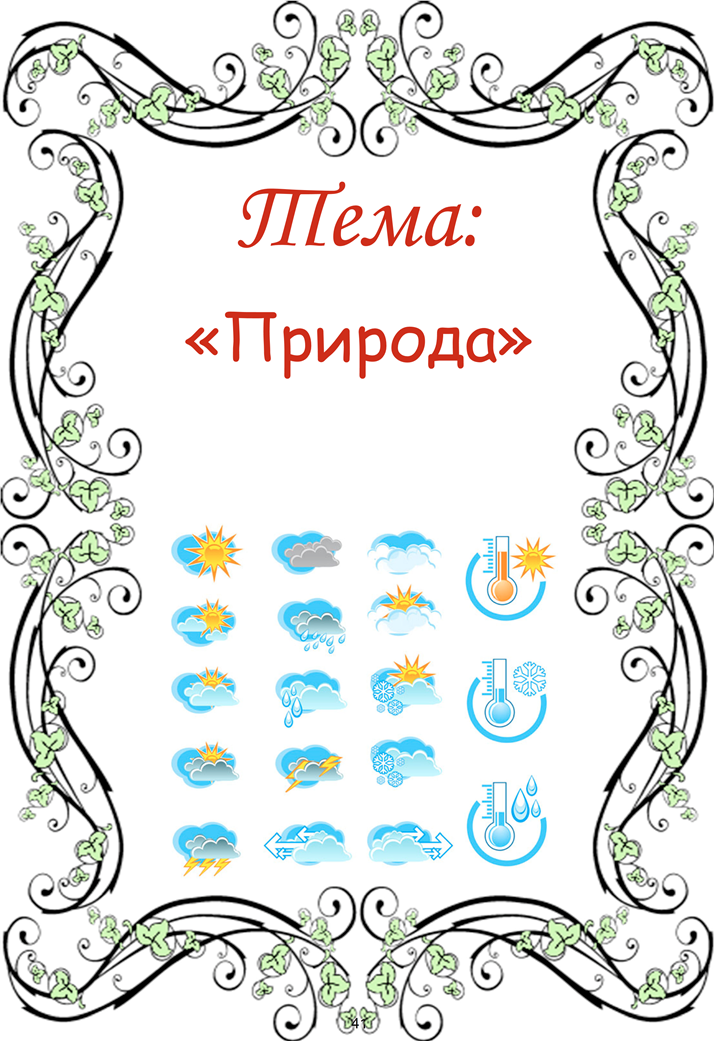
Listening 5 - teacher’s page -
WEATHER
1. Listen to the text:
1. Hi! My name is John. I’m at the beach now. My friends and I are playing volleyball now. It’s sunny and hot now. But warm sea water saves us from boiling. When we came here in the morning it was a bit cloudy. We were afraid that rain wouldn’t let us enjoy our weekend. But clouds are gone now. Sorry, I have to go now. My friends are calling. They want to have a snack.
2. Greetings from Liverpool! I’m Stella. I’m having a picnic in the park with my mum. The weather is nice. As you know, it’s usually chilly and foggy here in England. But today the sun is shining brightly. Mum is reading a book and I’m taking pictures of her. She’s so beautiful. Dad have to come soon. I’ll make him a sandwich. Also we have some fruit, tomato juice and hot coffee. Oh, here he comes! Hi, Dad!
3. Hello! I’m Mr.Stark. I’m a History teacher. I’m at the lesson now. My pupils are writing a test. They are very clever. Today is the 1st of December. And guess what? It’s snowing for the first time. I can’t wait for the break. I want to go outside with my pupils and make a snowman or play snowballs. The first snow always makes me feel like a little child.
But not everyone likes snow as much as we do. It covers everything and birds can’t find food. That’s why I want to ask my pupils to make bird tables. Also, we will go to the park to feed little squirrels. We have to help our little neighbours to survive in winter.
4. My name’s Stacy. I’m at the café. It’s windy, cold and rainy outside. The weather is awful. I’m hiding here, because I haven’t got my umbrella. It’s warm in the café. I ordered a cup of hot green tea with lemon and a piece of peach pie. It’s so cozy here. I like watching the rain with a cup of tea.
5. Hi from Canada! I’m Robin! Today is the 25th of November and my family and I decided to go snowboarding. It’s freezing cold here on the top of the mountain. But I put on my warm clothes and I’m not afraid of cold. It’s a bit windy. Yesterday it was chilly and sunny. Today is sunny too. I have to go. See you!
2. Listen and repeat words and word combinations:
1. a bit cloudy
2. to have a snack
3. chilly and foggy
4. to take pictures
5. to make bird tables
6. to survive
7. to order
8. on the top of
9. be afraid of
10. chilly and freezing cold
3. Choose the correct Ukrainian equivalent:
1. a bit cloudy a) вижити
2. to have a snack b) фотографувати
3. chilly and foggy c) трішки хмарно
4. to take pictures d) боятися
5. to make bird tables e) на вершині
6. to survive f) прохолодно та туманно
7. to order g) перекус
8. on the top of h) виготовляти годівниці
9. be afraid of i) холодрига
10. chilly and freezing cold j) замовляти
4. Listen to the text one more time.
5. Choose the correct answer to the question:
1. Where is John?
a) at the beach
b) in the park
c) on the top of the mountain 2. What is the weather like in Liverpool?
a) nice
b) foggy
c) rainy
3. What does Mr. Stark want to do outside?
a) to make a snowman
b) to play snowballs
c) to write a test
4. What does Stacy like doing in a rainy weather?
a) watching TV with a cup of coffee
b) watching the rain with a cup of tea
c) sleeping
5. What did Robin put on?
a) shorts and T-shirt
b) sweater and trousers
c) warm clothes
6. Whose mum is reading a book?
a) Stacy’s
b) Stella’s
c) John’s
6. Fill in the missing words or words combinations:
1. When we came here in the morning it was a bit _____.
2. It’s sunny and hot now. But warm sea water saves us from _____.
3. As you know, it’s usually chilly and_____ here in England.
4. Mum is reading a book and I’m taking_____ of her.
5. That’s why I want to ask my pupils to make _____ _____.
6. We have to help our little neighbours to _____ in winter.
7. I _____ a cup of hot green tea with lemon and a piece of peach pie.
8. It’s windy, cold and rainy _____.
9. It’s_____ cold here on the top of the mountain.
10. But I put on my warm clothes and I’m not_____ of cold.
7. Mark true (T) or false (F) sentences:
1. My friends and I are playing tennis now.
2. When we came here in the morning it was a bit cloudy.
3. I’m Stella. I’m having a picnic in the park with my mum.
4. As you know, it’s usually warm and sunny here in England.
5. Snow covers everything and birds can’t find food.
6. Also, we will go to the park to feed little bears.
7. I like watching the rain with a cup of tea.
8. The weather is awful. I’m hiding here, because I haven’t got my raincoat.
9. It’s freezing cold here on the top of the mountain.
10. Today is the 25th of November and my family and I decided to make a snowman.
8. Write some sentences about the weather you like.
Keys:
Exercise 3. 1) c, 2) g, 3) f, 4) b, 5) h, 6) a, 7) j, 8) e, 9) d, 10) i.
Exercise 5. 1) a, 2) a, 3) a, b, 4) b, 5) c, 6) b.
Exercise 6. 1) cloudy, 2) boiling, 3) foggy, 4) pictures, 5) bird tables, 6) survive, 7) ordered, 8) outside, 9) freezing, 10) afraid.
Exercise 7 1) F, 2) T, 3) T, 4) F, 5) T, 6) F, 7) T, 8) F, 9) T, 10) F.
![]()
Exercise 2 https://www.goconqr.com/en-US/p/11233270
Exercise 5 https://www.goconqr.com/en-US/p/11233587
Exercise 6 https://www.goconqr.com/en-US/p/11233758
Exercise 7 https://www.goconqr.com/en-US/p/11233403
Listening 5 -student’s page -
WEATHER
1. Listen to the text.
2. Listen and repeat words and word combinations:
1. a bit cloudy
2. to have a snack
3. chilly and foggy
4. to take pictures
5. to make bird tables
6. to survive
7. to order
8. on the top of
9. be afraid of
10. chilly and freezing cold
3. Choose the correct Ukrainian equivalent:
1. a bit cloudy a) вижити
2. to have a snack b) фотографувати
3. chilly and foggy c) трішки хмарно
4. to take pictures d) боятися
5.
to make bird tables e) на вершині
6. to survive f) прохолодно та туманно
7. to order g) перекус
8. on the top of h) виготовляти годівниці
9. be afraid of i) холодрига
10. chilly and freezing cold j) замовляти
4. Listen to the text one more time.
5. Choose the correct answer to the question:
1. Where is John?
a) at the beach
b) in the park
c) on the top of the mountain 2. What is the weather like in Liverpool?
a) nice
b) foggy
c) rainy
3. What does Mr. Stark want to do outside?
a) to make a snowman
b) to play snowballs
c) to write a test
4. What does Stacy like doing in a rainy weather?
a) watching TV with a cup of coffee
b) watching the rain with a cup of tea
c) sleeping
5. What did Robin put on?
a) shorts and T-shirt
b) sweater and trousers
c) warm clothes
6. Whose mum is reading a book?
a) Stacy’s
b) Stella’s
c) John’s
6. Fill in the missing words or words combinations:
1. When we came here in the morning it was a bit _____.
2. It’s sunny and hot now. But warm sea water saves us from _____.
3. As you know, it’s usually chilly and_____ here in England.
4. Mum is reading a book and I’m taking_____ of her.
5. That’s why I want to ask my pupils to make _____ _____.
6. We have to help our little neighbours to _____ in winter.
7. I _____ a cup of hot green tea with lemon and a piece of peach pie.
8.
It’s windy, cold and rainy _____.
9. It’s_____ cold here on the top of the mountain.
10. But I put on my warm clothes and I’m not_____ of cold.
7. Mark true (T) or false (F) sentences:
1. My friends and I are playing tennis now.
2. When we came here in the morning it was a bit cloudy.
3. I’m Stella. I’m having a picnic in the park with my mum.
4. As you know, it’s usually warm and sunny here in England.
5. Snow covers everything and birds can’t find food.
6. Also, we will go to the park to feed little bears.
7. I like watching the rain with a cup of tea.
8. The weather is awful. I’m hiding here, because I haven’t got my raincoat.
9. It’s freezing cold here on the top of the mountain.
10. Today is the 25th of November and my family and I decided to make a snowman.
8. Write some sentences about the weather you like.
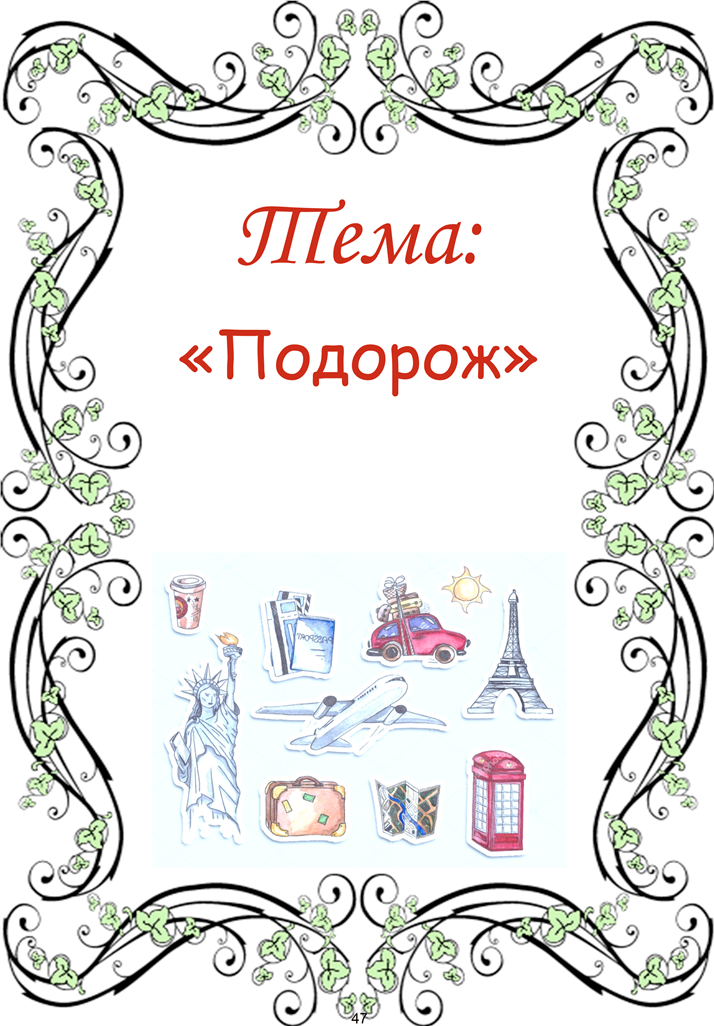
Listening 6 - teacher’s page -
TRAVELLING
1. Listen to the text:
We live in Ukraine. It’s our motherland and we are very proud to live in such a beautiful country. Ukraine is considered to be a heart of Europe because here, in the city which is called Rakhiv, there is a geographical centre of Europe.
Ukraine is the biggest European country. It’s territory is 603 549 sq km. It consists of 24 regions and the Republic of the Crimea. The capital of our motherland is Kyiv.
Ukraine is washed by the Black sea and the Sea of Azov. They are not very deep. Ukraine borders with 7 countries: Russia to the east, northeast, and south, Belarus to the northwest, Poland, Hungary and Slovakia to the west, Romania, and Moldova to the southwest.
The population is around 43 mln people. Many famous people were born in Ukraine and are known all over the world: Taras Shevchenko, Andriy Shevchenko, Klichko brothers. A great actress Mila Yovovich also has Ukrainian roots.
Official name of Great Britain is the United Kingdom of Great Britain and Northern Ireland. It is a parliamentary monarchy. Its area is 244 000 sq km., its population is 57 mln. The capital is London with almost 8mln residents.
Great Britain consists of four parts: England, Wales, Scotland and Northern Ireland. Each part has its own flag that are united into the British flag called The Union Jack. There are many unique places to visit in each country. When you are in Scotland, you should see castles and visit Loch-Ness. Who knows, maybe you’ll see the local monster. When you are in England go to Madam Tussaud’s wax museum and look at London from the bird’s high at London Eye.
The cheapest way to travel is by train. But if you want to see the country more carefully, you should travel by car. It would be more expensive, but you’ll see everything you want and won’t miss anything interesting.
Great Britain is washed by the Atlantic Ocean, with the North Sea to its east, the English Channel to its south and the Celtic Sea to its south-south-west.
Britain is a Motherland of such famous people as William Shakespeare, Charles Dickens, Alfred Hitchcock and a legendary band The Beatles.
Ukrainian and British cultures have many common and differ at the same time. We should respect traditions of each other and live in peace.
2. Listen and repeat words and word combinations:
1. to be proud
2. to be considered
3. to consist of
4. to be washed by
5. to border with
6. population
7. all over the world
8. a part
9. to be known
10. the bird’s high
3. Choose the correct Ukrainian equivalent:
1. to be proud a) частина
2. to be considered b) омиватися
3. to consist of c) вважатися
4. to be washed by d) пишатися
5. to border with e) населення
6. population f) складатися з
7. all over the world g) межувати
8. a part h) бути відомим
9. to be known i) в усьому світі
10. the bird’s high j) з висоти пташиного польоту
4. Listen to the text one more time.
5. Choose the correct answer to the question:
1. What is a heart of Europe?
a) Ukraine
b) Great Britain
c) Kyiv
2. How many regions does Ukraine consist of?
a) 24
b) 7
c) 12
3. What countries does Ukraine border with?
a) Russia, Belgium
b) Poland, Hungary and Slovakia
c) Romania, and Moldova
4. What is the capital of Great Britain?
a) London
b) Ukraine
c) Kyiv
5. How many parts does Great Britain consists of?
a) four parts
b) seven parts
c) three parts
6. What should you visit in Scotland?
a) Loch-Ness
b) Madam Tussaud’s wax museum
c) London Eye
6. Fill in the missing words or words combinations:
1. We live in Ukraine. It’s our motherland and we are very_____ to live in such beautiful country.
2. It_____ s of 24 regions and the Republic of the Crimea.
3. The _____ of our motherland is Kyiv.
4. Ukraine is_____ ed by the Black sea and the Sea of Azov.
5. Ukraine _____ s with 7 countries.
6. Many famous people were born in Ukraine and are known _____ _____ _____ _____.
7. Great Britain _____ s of four parts: England, Wales, Scotland and Northern Ireland.
8. The _____ is London with almost 8mln residents.
9. The cheapest way to travel is_____.
10. Britain is a _____ of such famous people as William Shakespeare, Charles Dickens, Alfred Hitchcock and a legendary band The Beatles.
7. Mark true (T) or false (F) sentences:
1. Ukraine is considered to be a heart of Europe.
2. The capital of our motherland is London.
3. Ukraine is washed by the Red sea and the Sea of Azov.
4. Ukraine borders with 5 countries: Russia to the east, northeast, and south, Belarus to the northwest, Poland, Slovakia to the west, Romania.
5. Many famous people were born in Ukraine and are known all over the world: Taras Shevchenko, Andriy Shevchenko, Klichko brothers.
6. Official name of Great Britain is the United Kingdom of Great Britain and Northern Ireland.
7. The capital of Great Britain is Cardif with almost 8 mln residents.
8. Great Britain consists of four parts: England, Wales, Scotland and Northern Ireland.
9. When you are in England go to visit Loch-Ness and look at London from the bird’s high at London Eye.
10. Britain is a Motherland of such famous people as William Shakespeare, Charles Dickens, Alfred Hitchcock and a legendary band The Beatles.
8. Write some sentences about your last trip.
Keys:
Exercise 3. 1) d, 2) c, 3) f, 4) b, 5) g, 6) e, 7) i, 8) a, 9) h, 10) j Exercise 5. 1) a, 2) a, 3) a, c, 4) a, 5) a, 6) a.
Exercise 6. 1) proud, 2) consists, 3) capital, 4) washed, 5) borders, 6) all over the world, 7) consists, 8) capital, 9) by train, 10) Motherland.
Exercise 7. 1) T, 2) F, 3) F, 4) F, 5) T, 6) T, 7) F, 8) T, 9) F, 10) T.
![]()
Exercise 2 https://www.goconqr.com/en-US/p/11366527
Exercise 5 https://www.goconqr.com/en-US/p/11366397
Exercise 6 https://www.goconqr.com/en-US/p/11366554
Exercise 7 https://www.goconqr.com/en-US/p/11366496
Listening 6 - student’s page -
TRAVELLING
1. Listen to the text.
2. Listen and repeat words and word combinations:
1. to be proud
2. to be considered
3. to consist of
4. to be washed by
5. to border with
6. population
7. all over the world
8. a part
9. to be known
10. the bird’s high
3. Choose the correct Ukrainian equivalent:
1. to be proud a) частина
2. to be considered b) омиватися
3. to consist of c) вважатися
4. to be washed by d) пишатися
5.
to border with e) населення
6. population f) складатися з
7. all over the world g) межувати
8. a part h) бути відомим
9. to be known i) в усьому світі
10. the bird’s high j) з висоти пташиного польоту
4. Listen to the text one more time.
5. Choose the correct answer to the question:
1. What is a heart of Europe?
a) Ukraine
b) Great Britain
c) Kyiv
2. How many regions does Ukraine consist of?
a) 24
b) 7
c) 12
3. What countries does Ukraine border with?
a) Russia, Belgium
b) Poland, Hungary and Slovakia
c) Romania, and Moldova
4. What is the capital of Great Britain?
a) London
b) Ukraine
c) Kyiv
5. How many parts does Great Britain consists of?
a) four parts
b) seven parts
c) three parts
6. What should you visit in Scotland?
a) Loch-Ness
b) Madam Tussaud’s wax museum
c) London Eye
6. Fill in the missing words or words combinations:
1. We live in Ukraine. It’s our motherland and we are very_____ to live in such beautiful country.
2. It_____ s of 24 regions and the Republic of the Crimea.
3. The _____ of our motherland is Kyiv.
4. Ukraine is_____ ed by the Black sea and the Sea of Azov.
5. Ukraine _____ s with 7 countries.
6. Many famous people were born in Ukraine and are known _____ _____ _____ _____.
7. Great Britain _____ s of four parts: England, Wales, Scotland and Northern Ireland.
8. The _____ is London with almost 8mln residents.
9.
The cheapest way to travel is_____.
10. Britain is a _____ of such famous people as William Shakespeare, Charles Dickens, Alfred Hitchcock and a legendary band The Beatles.
7. Mark true (T) or false (F) sentences:
1. Ukraine is considered to be a heart of Europe.
2. The capital of our motherland is London.
3. Ukraine is washed by the Red sea and the Sea of Azov.
4. Ukraine borders with 5 countries: Russia to the east, northeast, and south, Belarus to the northwest, Poland, Slovakia to the west, Romania.
5. Many famous people were born in Ukraine and are known all over the world: Taras Shevchenko, Andriy Shevchenko, Klichko brothers.
6. Official name of Great Britain is the United Kingdom of Great Britain and Northern Ireland.
7. The capital of Great Britain is Cardif with almost 8 mln residents.
8. Great Britain consists of four parts: England, Wales, Scotland and Northern Ireland.
9. When you are in England go to visit Loch-Ness and look at London from the bird’s high at London Eye.
10. Britain is a Motherland of such famous people as William Shakespeare, Charles Dickens, Alfred Hitchcock and a legendary band The Beatles.
8. Write some sentences about your last trip.
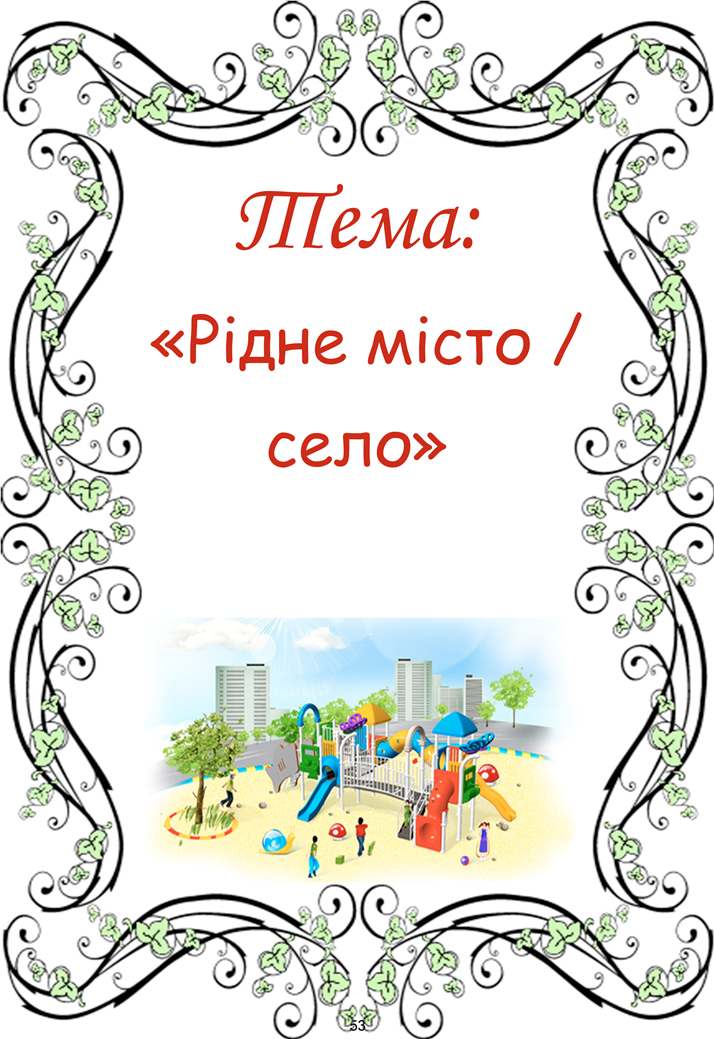
Listening 7 - teacher’s page -
ZAPORIZHZHYA
1. Listen to the text:
We live in Zaporizhzhya. It’s a wonderful city. It’s not little. Its territory is 331 sq.km. It has 7 regions. Zaporizhzhya stands on the banks of the river Dnipro. There are many beaches in the city where people can swim in summer.
Zaporizhzhya was founded in 952. It was called Alexandrovsk till 1921. Its population is 749 000 people. A lot of hard-working people live in our city: workers, teachers, doctors, shopassistants, businessmen. The head of the city is the mayor.
There are many beautiful parks, boulevards, alleys, monuments and fountains in the city. The biggest fountain is in Festyvalna square. There are also cinemas, theatres and an opera house. You can visit many outstanding sights in our city: DniproHES, Khortytsia island, Sobornyi prospect, Zaporizhzhzyan oak tree.
DniproHES is the largest hydroelectric power station on the Dnipro River. It has a long history. It was destroyed during the World War and reconstructed afterwards. Today it’s still working. The dam is also used by traffic.
Khortytsia is the biggest island on the river Dnipro. Many years ago Cossaks lived there. They defended our country from foreign aliens. Cossaks were brave men who loved their motherland more than everything.
Sobornyi prospect is one of the longest prospects in Europe. Its length is 10.8 km. It’s especially beautiful at night when different lights are sparkling along it. Also it’s lovely in spring, when chestnut trees are blooming.
Zaporizhzhzyan oak tree is the most wonderful tree. It’s more than 700 years old. Once it was spectacular and huge. This oak was 36 m tall. In 1990-ies the oak almost died. Now there is only one branch left.
Zaporizhzhya is a very beautiful city, but we can’t call it clean enough. It’s one of the largest industrial centres. There are many plants and factories here. They pollute the air. People hurt the nature and nature hurt our health. Pollution causes many illnesses and diseases. We must help nature. So, each year many Zaporizhzhyan families take part in voluntary Saturday work. We clean up our city and make it more beautiful.
We love our city. We are very proud to live here.
2. Listen and repeat words and word combinations:
1. stands on the banks
2. the mayor
3. was founded
4. population
5. outstanding sights
6. dam
7. traffic
8. defend
9. bloom
10. take part in
3. Choose the correct Ukrainian equivalent:
1. stands on the banks a) дамба
2. the mayor b) рух
3. was founded c) розташований на берегу
4. population d) мер
5. outstanding sights e) населення
6. dam f) було засноване
7. traffic g) видатні місця
8. defend h) цвісти
9. bloom i) приймати участь
10. take part in j) захищати
4. Listen to the text one more time.
5. Choose the correct answer to the question:
1. Where does Zaporizhzhya stand?
a) on the top of the mountain
b) on the banks of the river
c) at the beach
2. When was Zaporizhzhya founded?
a) 952
b) 1921
c) 1990
3. Who defended our country from foreign aliens?
a) Ukrainian army
b) Cossaks
c) Ukrainian school boy
4. What street is the longest in Zaporizhzhya?
a) Pobeda Street
b) Sobornyi prospect
c) Metalurgov prospect
5. What causes many illnesses and diseases?
a) pollution
b) nature
c) blooming trees
6. What do many Zaporizhzhyans do to help nature each year?
a) take part in voluntary Saturday work
b) hurt the nature
c) proud to live here
6. Fill in the missing words or words combinations:
1. Zaporizhzhya _____ on the banks of the river Dnipro.
2. Zaporizhzhya was _____ in 952.
3. Its _____ is 749 000 people.
4. The head of the city is the_____.
5. You can visit many_____ sights in our city
6. Many years ago Cossaks lived there. They _____ our country from foreign aliens.
7. Also it’s lovely in spring, when chestnut trees are _____.
8. There are many plants and factories here. They_____ the air.
9. So, each year many Zaporizhzhyan families _____ _____ in voluntary Saturday work. 10. We are very _____ to live here
7. Mark true (T) or false (F) sentences:
1. There are many rivers in the city where people can swim in summer.
2. A lot of hard-working people live in our city: workers, teachers, doctors, shop-assistants, businessmen.
3. DniproHES is the largest hydroelectric power station on the Dniester River.
4. DniproHES was destroyed during the World War and reconstructed afterwards.
5. Khortytsia is the biggest beach on the river Dnipro.
6. Cossaks were brave men who loved their motherland more than everything.
7. Sobornyi prospect is one of the longest prospects in Ukraine.
8. Sobornyi prospect is lovely in spring, when chestnut trees are blooming.
9. Pollution causes many illnesses and diseases.
10. Each year many Zaporizhzhyan families take part in voluntary Saturday work.
8. Write some sentences why you like Zaporizhzhya.
Keys:
Exercise 3. 1) c, 2) d, 3) f, 4) e, 5) g, 6) a, 7) b, 8) j, 9) h, 10) i.
Exercise 5. 1) b, 2) a, 3) b, 4) b, 5) a, 6) a.
Exercise 6. 1) stands, 2) founded, 3) population, 4) mayor, 5) outstanding, 6) defended, 7) blooming, 8) pollute, 9) take part, 10) proud.
Exercise 7. 1) F, 2) T, 3) T, 4) T, 5) F, 6) T, 7) F, 8) T, 9) T, 10) T.
![]()
Exercise 2 https://www.goconqr.com/en-US/p/11234100
Exercise 5 https://www.goconqr.com/en-US/p/11252038
Exercise 6 https://www.goconqr.com/en-US/p/11345623
Exercise 7 https://www.goconqr.com/en-US/p/11251984
Listening 7 - student’s page -
ZAPORIZHZHYA
1. Listen to the text.
2. Listen and repeat words and word combinations:
1. stands on the banks
2. the mayor
3. was founded
4. population
5. outstanding sights
6. dam
7. traffic
8. defend
9. bloom
10. take part in
3. Choose the correct Ukrainian equivalent:
1. stands on the banks a) дамба
2. the mayor b) рух
3. was founded c) розташований на берегу
4. population d) мер
5.
outstanding sights e) населення
6. dam f) було засноване
7. traffic g) видатні місця
8. defend h) цвісти
9. bloom i) приймати участь
10. take part in j) захищати
4. Listen to the text one more time.
5. Choose the correct answer to the question:
1. Where does Zaporizhzhya stand?
a) on the top of the mountain
b) on the banks of the river
c) at the beach
2. When was Zaporizhzhya founded?
a) 952
b) 1921
c) 1990
3. Who defended our country from foreign aliens?
a) Ukrainian army
b) Cossaks
c) Ukrainian school boy
4. What street is the longest in Zaporizhzhya?
a) Pobeda Street
b) Sobornyi prospect
c) Metalurgov prospect
5. What causes many illnesses and diseases?
a) pollution
b) nature
c) blooming trees
6. What do many Zaporizhzhyans do to help nature each year?
a) take part in voluntary Saturday work
b) hurt the nature
c) proud to live here
6. Fill in the missing words or words combinations:
1. Zaporizhzhya _____ on the banks of the river Dnipro.
2. Zaporizhzhya was _____ in 952.
3. Its _____ is 749 000 people.
4. The head of the city is the_____.
5. You can visit many_____ sights in our city
6. Many years ago Cossaks lived there. They _____ our country from foreign aliens.
7. Also it’s lovely in spring, when chestnut trees are _____.
8. There are many plants and factories here. They_____ the air.
9.
So, each year many Zaporizhzhyan families _____ _____ in voluntary Saturday work. 10. We are very _____ to live here
7. Mark true (T) or false (F) sentences:
1. There are many rivers in the city where people can swim in summer.
2. A lot of hard-working people live in our city: workers, teachers, doctors, shop-assistants, businessmen.
3. DniproHES is the largest hydroelectric power station on the Dniester River.
4. DniproHES was destroyed during the World War and reconstructed afterwards.
5. Khortytsia is the biggest beach on the river Dnipro.
6. Cossaks were brave men who loved their motherland more than everything.
7. Sobornyi prospect is one of the longest prospects in Ukraine.
8. Sobornyi prospect is lovely in spring, when chestnut trees are blooming.
9. Pollution causes many illnesses and diseases.
10. Each year many Zaporizhzhyan families take part in voluntary Saturday work.
8. Write some sentences why you like Zaporizhzhya.
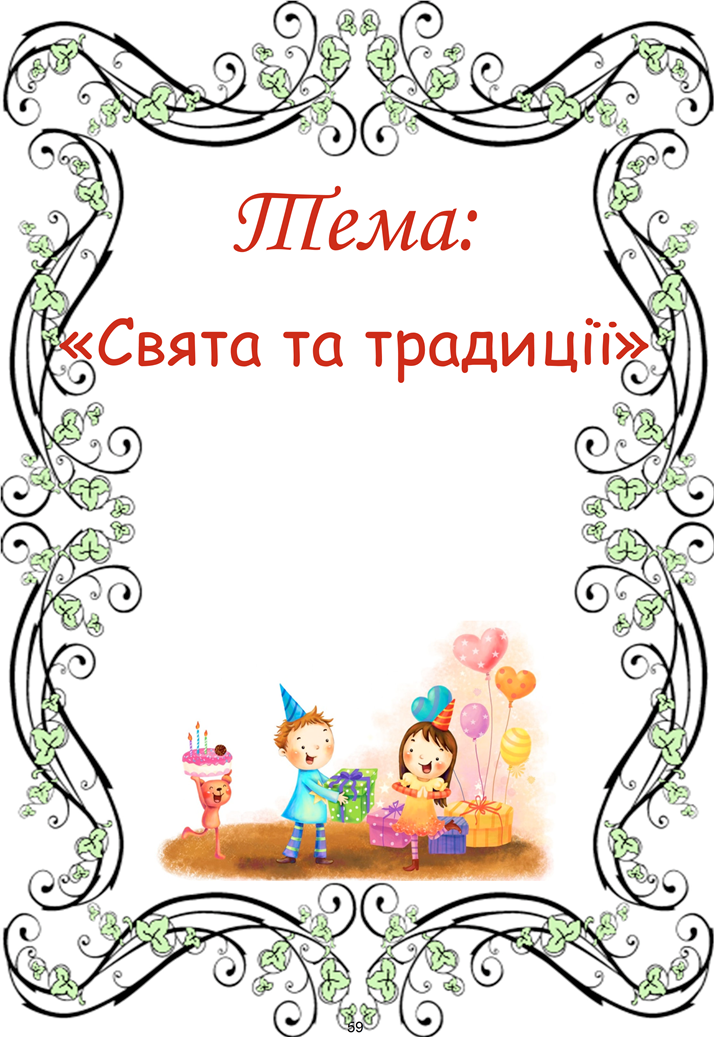
Listening 8 - teacher’s page -
TRADITIONS
1. Listen to the dialogue:
Lesya: Hi, Jessiсa! It’s Lesya. We met at a summer camp this year. Remember?
Jessiсa: Oh! Hi, Lesya! It’s so nice to hear you! How are you?
Lesya: I’m fine, thanks. And you?
Jessiсa: Oh, dear. I’m so-so.
Lesya: Why, Jessica? What’s happened?
Jessiсa: You see, Lesya, my teacher gave me a task to write a composition about festivals in some foreign country. When I came home I found out that our Internet stopped working. I don’t know what to do.
Lesya: That’s not a problem. Let me help you. I’ll tell you about some interesting festivals in Ukraine and you tell me about American festivals.
Jessiсa: I like the idea. So, Lesya, what’s your favourite winter holiday?
Lesya: My favourite winter holiday is Christmas. We celebrate it on the 7th of January. We make a special dinner with 12 dishes. The main dish on the table is kutia. My mum makes it with rice, stewed fruit, walnuts and raisins.
Jessiсa: I love Christmas too. But we celebrate it on the 25th of December. We get a lot of presents from our relatives on Christmas. And our special dish is pudding. What about summer?
Lesya: On the 7th of July we celebrate Ivana Kupala. We jump through the bonfire at night, girls make wreaths and seek a rare flower.
Jessiсa: Lesya, what a wild holiday! But that sounds interesting. We also have unusual festival. It’s on the 31th of October. It’s called Halloween. We dress like witches and go from house to house saying ‘Trick or treat’. People give us sweets. Also we carve Jack-o-lanterns and scare each other.
Lesya: Jess, tell me, do you have any festivals when you greet your mothers?
Jessiсa: Yes. It’s Mother’s Day. We celebrate it on the 2nd Sunday of May. What about you?
Lesya: We have the 8th of March. We greet all girls and women...Oh, Jess, my mum is asking me to help her with dinner. I have to go. I hope I could help you a little with your hometask. By the way, why don’t you call Erica. She was in the camp with us too. If I’m not mistaken, she is from Germany.
Jessiсa: Lesya, I’m so glad you called me. You saved me from a bad mark. Thank you very much. I’ll call Erica. And tomorrow I’ll tell you about my composition and my mark. Bye! Lesya: Bye, Jess! Good luck!
2. Listen and repeat words and word combinations:
1. What’s happened?
2. to write a composition
3. to find out
4. stewed fruit
5. walnuts and raisins
6. to make wreaths
7. to carve
8. But that sounds interesting.
9. to jump through the bonfire
10. to scare each other
3. Choose the correct Ukrainian equivalent:
1. What’s happened?
2. to write a composition
3. to find out
4. stewed fruit
5. walnuts and raisins
6. to make wreaths
7. to carve
8. But that sounds interesting.
9. to jump through the bonfire
10. to scare each other
4. Listen to the text one more time.
a) узвар
b) дізнаватися
c) Що сталося?
d) писати твір
e) лякати один іншого
f) грецькі горіхи та родзинки
g) стрибати через вогнище
h) вирізблювати
i) плести вінки
j) Але це виглядає цікаво!
5. Choose the correct answer to the question:
1. What is Lesya’s task?
a) to write a composition about festivals
b) to tell about some interesting festivals
c) to jump through the bonfire at night 2. What’s Lesya and Jessica’s favourite holiday?
a) Christmas
b) Halloween
c) Mother’s Day
3. What holiday seems wild to Jessica?
a) Halloween
b) Ivana Kupala
c) Christmas
4. What festival is unusual for Jessiсa?
a) Halloween
b) Ivana Kupala
c) Mother’s Day
5. When does Jessiсa greet her mother?
a) in March
b) in May
c) in October
6. Who is from Germany?
a) Erica
b) Lesya
c) Jessiсa
6. Fill in the missing words or words combinations:
1. Lesya, my teacher gave me a task to_____ a _____ about festivals in some foreign country.
2. When I came home I _____ _____ that our Internet stopped working. I don’t know what to do.
3. My favourite winter holiday is _____.
4. We make a special dinner with 12 dishes. The main dish on the table is _____.
5. I love Christmas too. But we celebrate it on the 25th of December. Our special dish is _____.
6. We jump through the _____ at night.
7. Girls _____ wreaths and seek a rare flower.
8. We also have unusual festival. It’s on the 31th of October. It’s called _____.
9. Also we _____ Jack-o-lanterns and scare each other.
10. And tomorrow I’ll tell you about my _____ and my mark. Bye!
7. Mark true (T) or false (F) sentences:
1. My teacher gave me a task to write a composition about sights in some foreign country. 2. I’ll tell you about some interesting festivals in Ukraine and you tell me about American festivals.
3. My favourite winter holiday is Ivana Kupala.
4. We celebrate it on the 7th of January. The main dish on the table are sweets.
5. But we celebrate it on the 25th of December. And our special dish is pudding.
6. On the 7th of July we celebrate Mother’s Day.
7. We jump through the bonfire at night, girls make wreaths and seek a rare flower.
8. We dress like witches and go from house to house saying ‘Trick or treat’. People give us sweets.
9. It’s Mother’s Day. We celebrate it on the 2nd Sunday of May.
10. We have the 8th of March. We greet all boys and men.
8. Write some sentences about your favourite festival or about your family tradition.
Keys:
Exercise 3. 1) c, 2) d, 3) b, 4) a, 5) f, 6) i, 7) h, 8) j, 9) g, 10) e.
Exercise 5. 1) a, 2) a, 3) b, 4) a, 5) b, 6) a.
Exercise 6. 1) write a composition, 2) found out, 3) Christmas, 4) kutia, 5) pudding, 6) bonfire, 7) make, 8) Halloween, 9) carve, 10) composition.
Exercise 7. 1) F, 2) T, 3) F, 4) F, 5) T, 6) F, 7) T, 8) T, 9) T, 10) F.
![]()
Exercise 2 https://www.goconqr.com/en-US/p/11252100
Exercise 5 https://www.goconqr.com/en-US/p/11270532
Exercise 6 https://www.goconqr.com/en-US/p/11291765
Exercise 7 https://www.goconqr.com/en-US/p/11270470
Listening 8 - student’s page -
TRADITIONS
1. Listen to the dialogue.
2. Listen and repeat words and word combinations:
1. What’s happened?
2. to write a composition
3. to find out
4. stewed fruit
5. walnuts and raisins
6. to make wreaths
7. to carve
8. But that sounds interesting.
9. to jump through the bonfire
10. to scare each other
3. Choose the correct Ukrainian equivalent:
1. What’s happened?
2. to write a composition
3. to find out
4. stewed fruit
5. walnuts and raisins
6. to make wreaths
7. to carve
8. But that sounds interesting.
9.
to jump through the bonfire
10. to scare each other
4. Listen to the text one more time.
a) узвар
b) дізнаватися
c) Що сталося?
d) писати твір
e) лякати один іншого
f) грецькі горіхи та родзинки
g) стрибати через вогнище
h) вирізблювати
i) плести вінки
j) Але це виглядає цікаво!
5. Choose the correct answer to the question:
1. What is Lesya’s task?
a) to write a composition about festivals
b) to tell about some interesting festivals
c) to jump through the bonfire at night 2. What’s Lesya and Jessica’s favourite holiday?
a) Christmas
b) Halloween
c) Mother’s Day
3. What holiday seems wild to Jessica?
a) Halloween
b) Ivana Kupala
c) Christmas
![]()
4. What festival is unusual for Jessica?
a) Halloween
b) Ivana Kupala
c) Mother’s Day
5. When does Jessica greet her mother?
a) in March
b) in May
c) in October
6. Who is from Germany?
a) Erica
b) Lesya
c) Jessica
6. Fill in the missing words or words combinations:
1. Lesya, my teacher gave me a task to_____ a _____ about festivals in some foreign country.
2. When I came home I _____ _____ that our Internet stopped working. I don’t know what to do.
3. My favourite winter holiday is _____.
4. We make a special dinner with 12 dishes. The main dish on the table is _____.
5.
I love Christmas too. But we celebrate it on the 25th of December. Our special dish is _____.
6. We jump through the _____ at night.
7. Girls _____ wreaths and seek a rare flower.
8. We also have unusual festival. It’s on the 31th of October. It’s called _____.
9. Also we _____ Jack-o-lanterns and scare each other.
10. And tomorrow I’ll tell you about my _____ and my mark. Bye!
7. Mark true (T) or false (F) sentences:
1. My teacher gave me a task to write a composition about sights in some foreign country. 2. I’ll tell you about some interesting festivals in Ukraine and you tell me about American festivals.
3. My favourite winter holiday is Ivana Kupala.
4. We celebrate it on the 7th of January. The main dish on the table are sweets.
5. But we celebrate it on the 25th of December. And our special dish is pudding.
6. On the 7th of July we celebrate Mother’s Day.
7. We jump through the bonfire at night, girls make wreaths and seek a rare flower.
8. We dress like witches and go from house to house saying ‘Trick or treat’. People give us sweets.
9. It’s Mother’s Day. We celebrate it on the 2nd Sunday of May.
10. We have the 8th of March. We greet all boys and men.
8. Write some sentences about your favourite festival or about your family tradition.
![]()
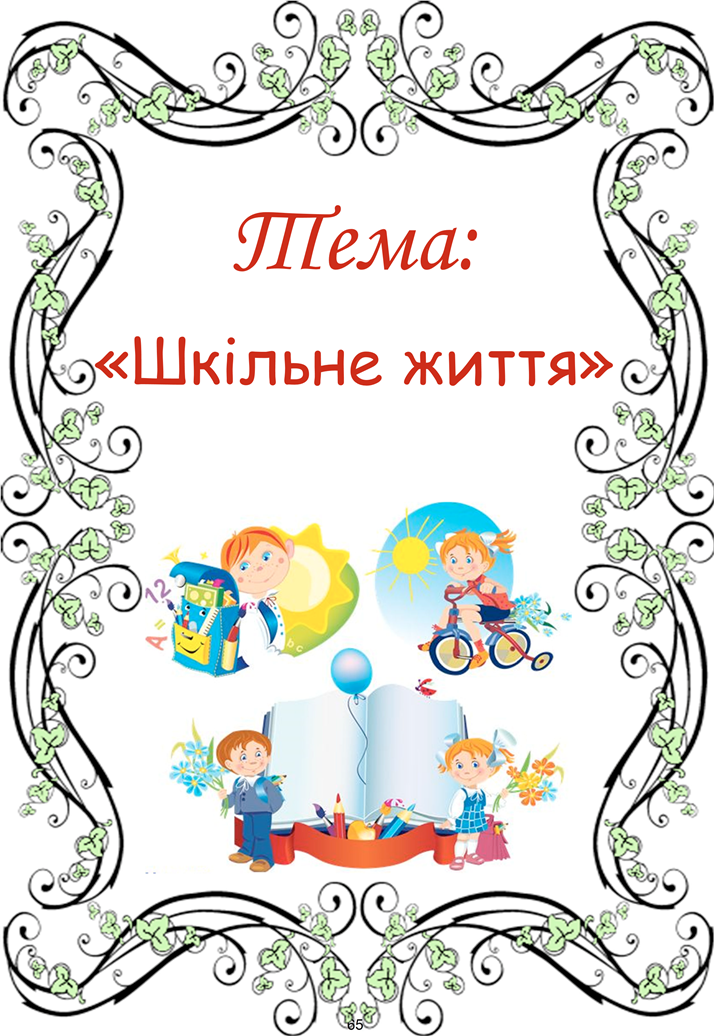
Listening 9 - teacher’s page -
SCHOOL LIFE
1. Listen to the text:
Hello! My name’s Mike. I’m 14 and I’m a pupil of the 7th form. I study at a secondary school # 948. It’s not far from my house. My school isn’t old. It was built in 2005. There are big light cozy classrooms, a canteen, a school hall and a sports hall. It’s very beautiful with all its flowers and benches standing along the corridors.
Our teachers are very clever. They are also very strict, but kind. I love them.
I have 7 lessons almost every day. Today is Wednesday. I have just 6 lessons: English, Maths, Literature, Art, PE and Ukrainian. The lessons start at 8 o’clock. I’m on duty today, so I must come at 7.30. I help my teacher: I have to open the window, water the flowers, and wet the duster.
The bell rings and pupils come in the classroom. English is my first lesson today. At the English lesson we read and translate interesting texts. We learn new words, act dialogues. Sometimes we watch videos about British traditions. Then we discuss the difference between our cultures. That is my favourite kind of lesson.
Next, I have Maths. I like the teacher, but I don’t really love the subject. I am not quite good at Maths. I can do sums, but I can’t remember all those formulas.
Literature is my favourite subject. I like reading about different heroes and discuss them. I like books. There are answers for my questions there. Books are full of different worlds. We can live in them for a while. It’s fantastic!
After the 3rd lesson we have a big break. I go to the canteen. I eat some soup, pasta with meat and some cabbage salad. Then I drink some tea.
The fourth lesson begins. It’s Art. I can’t paint very well, but I’m trying really hard.
Then we have PE. Everybody loves it. We usually run, jump, do the exercises. Sometimes we play football or volleyball. Today our teacher told us about The Health Day. It will be on Friday. We won’t have lessons. We’ll go to the park and spend the whole day there. I can’t wait. I want to help my PE teacher organize the games.
Ukrainian is the last lesson. It’s great. We study our native language. At every lesson I learn some new things and my language doesn’t stop surprising me. I’ve got the best mark for this subject.
After school I go home, do my homework and wait for the next day to learn something new about our world.
2. Listen and repeat words and word combinations:
1. a secondary school
2. cozy classrooms
3. to be on duty
4. to wet the duster
5. to discuss the difference
6. to do sums
7. to be full of
8. for a while
9. native language
10. to surprise
3. Choose the correct Ukrainian equivalent:
1. a secondary school a) рідна мова
2. cozy classrooms b) розв’язувати задачі
3. to be on duty c) комфортні класні кімнати
4. to wet the duster d) середня школа
5. to discuss the difference e) бути черговим
6. to do sums f) намочити ганчірку
7. to be full of g) здивувати
8. for a while h) обговорювати різницю
9. native language i) тимчасово
10. to surprise j) бути наповненим чимось
4. Listen to the text one more time.
5. Choose the correct answer to the question:
1. Where does Mike study at?
a) at a secondary school
b) at a gymnasium
c) at a college
2. What must Mike do when he is on duty?
a) open the window and water the flowers
b) water the flowers and wet the duster.
c) do sums and remember formulas.
3. What is Mike’s favourite kind of lesson at the English lesson?
a) discuss the difference between our cultures
b) read and translate interesting texts
c) act dialogues and watch videos about British traditions.
4. What subject isn’t Mike good at?
a) Maths
b) PE
c) Literature
5. What is Mike’s favourite subject?
a) Literature
b) Art
c) Ukrainian
6. What subject has Mike got the best marks for?
a) Ukrainian
b) English
c) Maths
6. Fill in the missing words or words combinations:
1. My name’s Mike. I study at a _____ school # 948.
2. There are big light_____ classrooms, a canteen, a school hall and a sports hall.
3. I’m on _____ today, so I must come at 7.30. I help my teacher.
4. I have to open the window, water the flowers, and _____ the _____
5. Then we discuss the_____ between our cultures.
6. I can _____ _____ but I can’t remember all those formulas.
7. Books are ________ of different worlds.
8. Books are full of different worlds. We can live in them _____. It’s fantastic!
9. Ukrainian is the last lesson. It’s great. We study our_____ language.
10. At every lesson I learn some new things and my language doesn’t stop _____ me.
7. Mark true (T) or false (F) sentences:
1. Our teachers are very clever. They are also very strict, but kind. I love them.
2. Today is Wednesday. I have just 7 lessons: English, Maths, Literature, Art, PE and Ukrainian.
3. The bell rings and pupils go out of the classroom.
4. At the English lesson we read and translate interesting texts.
5. Then we discuss the difference between our cultures. That is my favourite kind of lesson.
6. Next, I have Maths. I don’t like the teacher, but I really love the subject.
7. Literature is my favourite subject. I like reading about different heroes and discuss them.
8. Films are full of different worlds. We can live in them for a while. It’s fantastic!
9. It’s Art. I can’t paint very well, but I’m trying really hard.
10. Then we have PE. Everybody doesn’t love it. We usually run, jump, do the exercises.
8. Write some sentences about your favourite subject.
Keys:
Exercise 3. 1) d, 2) c, 3) e, 4) f, 5) h, 6) b, 7) j, 8) i, 9) a, 10) g.
Exercise 5. 1) a, 2) a, b, 3) a, 4) a, 5) c, 6) a.
Exercise 6. 1) secondary school, 2) cozy, 3) duty, 4) wet the duster, 5) difference, 6) do sums, 7) full, 8) for a while, 9) native, 10) surprising.
Exercise 7. 1) T, 2) F, 3) F, 4) T, 5) T, 6) F, 7) T, 8) F, 9) T, 10) F.

Exercise 2 https://www.goconqr.com/en-US/p/11270624
Exercise 5 https://www.goconqr.com/en-US/p/11270674
Exercise 6 https://www.goconqr.com/en-US/p/11291257
Exercise 7 https://www.goconqr.com/en-US/p/11291147
Listening 9 - student’s page -
SCHOOL LIFE
1. Listen to the text.
2. Listen and repeat words and word combinations:
1. a secondary school
2. cozy classrooms
3. to be on duty
4. to wet the duster
5. to discuss the difference
6. to do sums
7. to be full of
8. for a while
9. native language
10. to surprise
3. Choose the correct Ukrainian equivalent:
1. a secondary school a) рідна мова
2. cozy classrooms b) розв’язувати задачі
3. to be on duty c) комфортні класні кімнати
4. to wet the duster d) середня школа
5.
to discuss the difference e) бути черговим
6. to do sums f) намочити ганчірку
7. to be full of g) здивувати
8. for a while h) обговорювати різницю
9. native language i) тимчасово
10. to surprise j) бути наповненим чимось
4. Listen to the text one more time.
5. Choose the correct answer to the question:
1. Where does Mike study at?
a) at a secondary school
b) at a gymnasium
c) at a college
2. What must Mike do when he is on duty?
a) open the window and water the flowers
b) water the flowers and wet the duster.
c) do sums and remember formulas.
3. What is Mike’s favourite kind of lesson at the English lesson?
a) discuss the difference between our cultures
b) read and translate interesting texts
c) act dialogues and watch videos about British traditions.
4. What subject isn’t Mike good at?
![]()
a) Maths
b) PE
c) Literature
5. What is Mike’s favourite subject?
a) Literature
b) Art
c) Ukrainian
6. What subject has Mike got the best marks for?
a) Ukrainian
b) English
c) Maths
6. Fill in the missing words or words combinations:
1. My name’s Mike. I study at a _____ school # 948.
2. There are big light_____ classrooms, a canteen, a school hall and a sports hall.
3. I’m on _____ today, so I must come at 7.30. I help my teacher.
4. I have to open the window, water the flowers, and _____ the _____
5. Then we discuss the_____ between our cultures.
6. I can _____ _____ but I can’t remember all those formulas.
7.
Books are ________ of different worlds.
8. Books are full of different worlds. We can live in them _____. It’s fantastic!
9. Ukrainian is the last lesson. It’s great. We study our_____ language.
10. At every lesson I learn some new things and my language doesn’t stop _____ me.
7. Mark true (T) or false (F) sentences:
1. Our teachers are very clever. They are also very strict, but kind. I love them.
2. Today is Wednesday. I have just 7 lessons: English, Maths, Literature, Art, PE and Ukrainian.
3. The bell rings and pupils go out of the classroom.
4. At the English lesson we read and translate interesting texts.
5. Then we discuss the difference between our cultures. That is my favourite kind of lesson.
6. Next, I have Maths. I don’t like the teacher, but I really love the subject.
7. Literature is my favourite subject. I like reading about different heroes and discuss them.
8. Films are full of different worlds. We can live in them for a while. It’s fantastic!
9. It’s Art. I can’t paint very well, but I’m trying really hard.
10. Then we have PE. Everybody doesn’t love it. We usually run, jump, do the exercises.
8. Write some sentences about your favourite subject.
![]()
![]() СПИСОК ВИКОРИСТАНОЇ ЛІТЕРАТУРИ:
СПИСОК ВИКОРИСТАНОЇ ЛІТЕРАТУРИ:
1. Закон України «Про освіту».
2. Концепція Нової української школи.
3. Навчальні програми з іноземних мов для загальноосвітніх навчальних закладів і спеціалізованих шкіл з поглибленим вивченням іноземних мов 5-9 класи, 2017.
4. Артеменко Л. Пошук нових технологій викладання англійської мови // Новий колегіум.–2012.–No6.
5. Волкова Н.П. Педагогіка: Навч. посіб. – К.: Академвидав, 2007. – 616 с.
6. Гусак Т. Методологія викладання іноземних мов // Рідна школа. –2006.– No2.–С.58-62.
7. Єрмаков І. Г. Метод проектів у контексті життєвих результатів діяльності у системі соціальної та життєвої практики учнів. Частина І / І. Г. Єрмаков // Постметодика. –2016. – № 2. – С. 24-34
8. Ключковська І.М. Інноваційні підходи у викладанні іноземних мов // Сучасні проблеми лінгвістики та навчання іноземних мов у контексті – К.: Знання, 2015.
9. Першукова О. Інтеграція сучасних підходів до навчання іноземних мов у країнах Європи / О. Першукова // Іноземні мови в навчальних закладах. – 2009. – № 1.
10. Редько В. Відчинити вікно в інший світ : інтеркультурний підхід до навчання іноземних мов – нова парадигма в шкільній іншомовній освіті / В. Редько, Л. Мамонова, С. Полякова // Іноземні мови в навчальних закладах – 2016.
11. Родигіна І. В. Компетентнісний підхід в освіті: синергетичний вимір / І. В. Родигіна // Наукова скарбниця освіти Донеччини. – 2014. – № 1. –С. 44-49.
12. Стрельнікова Л.Г. Концептуальні питання імплементації сучасних методів навчання іноземних мов / Л.Г. Стрельнікова, А.Л. Касьяненко // Нові технології навчання : наук.-метод. зб. / Кол. авт. –К.: НМЦВО, 2015. – Вип. 40.

____________________________________________________________________
____________________________________________________________________
____________________________________________________________________
____________________________________________________________________
____________________________________________________________________
____________________________________________________________________
____________________________________________________________________
____________________________________________________________________
____________________________________________________________________
____________________________________________________________________
____________________________________________________________________
____________________________________________________________________
____________________________________________________________________
____________________________________________________________________
____________________________________________________________________
____________________________________________________________________
____________________________________________________________________
____________________________________________________________________
____________________________________________________________________
____________________________________________________________________
____________________________________________________________________
____________________________________________________________________
____________________________________________________________________
____________________________________________________________________
____________________________________________________________________
____________________________________________________________________
____________________________________________________________________
____________________________________________________________________
____________________________________________________________________
____________________________________________________________________
____________________________________________________________________
____________________________________________________________________
____________________________________________________________________
____________________________________________________________________
____________________________________________________________________
____________________________________________________________________
____________________________________________________________________
____________________________________________________________________
____________________________________________________________________


про публікацію авторської розробки
Додати розробку
